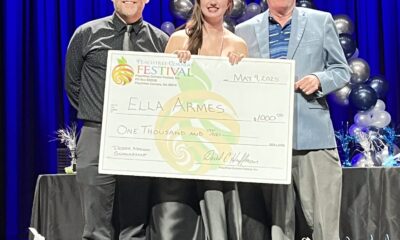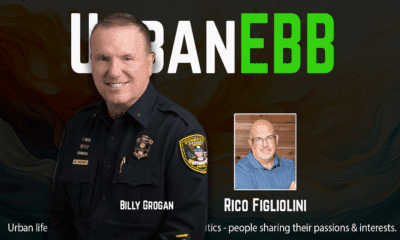Business
Capitalist Sage: How Business Mentorship Empowers Entrepreneurs, with Erin Igleheart [Podcast]
Published
6 years agoon
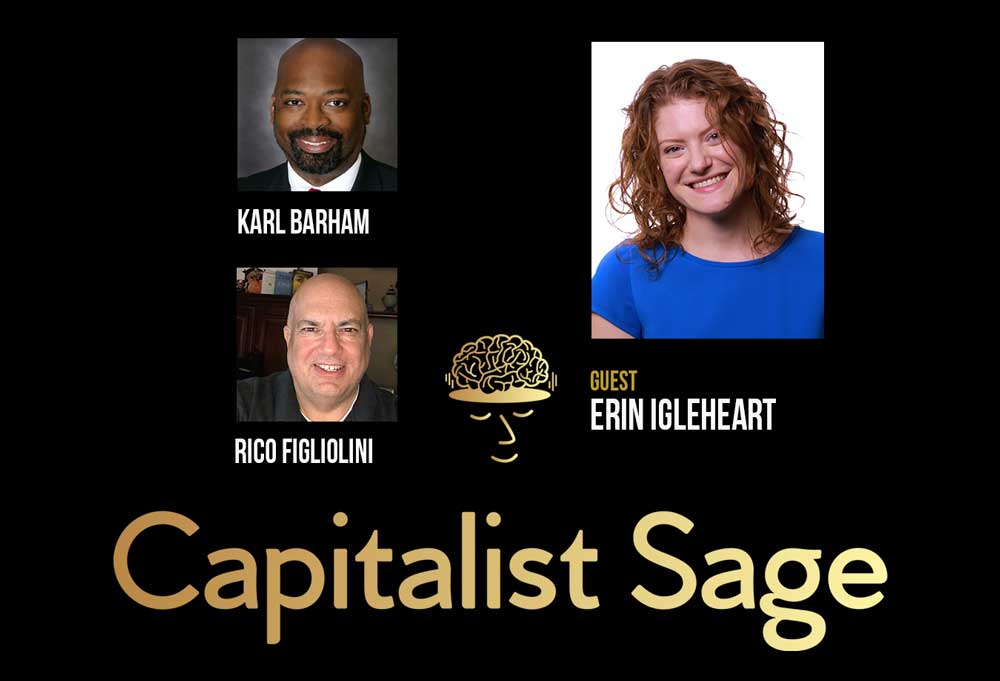
Have you ever had a business idea, wondered what tools you needed, or wanted to know how to just start? Join Rico Figliolini and Karl Barham as they interview Erin Igleheart, program manager with the Start Me accelerator program. Erin has experience and answers to all of the questions you may have about starting a business.
Resources: StartMeATL.org
Social Media: @StartMe

Podcast transcript – generated from voice recognition software.
Karl: [1:11] Welcome to the Capitalist Sage Podcast. We’re here to bring you advice and tips from seasoned pros and experts to help you improve your business. I’m Karl Barham with TransWorld business advisors. My co-host is Rico Figliolini with Mighty Rockets Digital Marketing and the publisher of the Peachtree Corner Magazine. Hey Rico, how’re you doing?
Rico: [1:27] Good. Good, Karl.
Karl: [1:28] Excellent. Why don’t we talk about our sponsors for today.
Rico: [1:32] Sure. Let’s give a shout out first to Atlanta Tech Park located here in Tech Park Atlanta, like the name switch, in the city of Peachtree Corners. Robin Bienfait and her innovative team is curating this place. Allowing accelerator startups and small companies to be able to grow in it. Phenomenal organized environment here that allows for workshops, seminars, all sorts of supportive groups that can take a small company to its success. So one of the podcasts from here is located in that place, and it’s a good place to be.
Karl: [2:11] Absolutely you could always stop by, check out its website; AtlantaTechPark.com check out upcoming events. You know in November, I think November 14th, is a tech showcase going on here from North Atlanta. Lots of events and you happen to be on the path of the shuttle, the driverless shuttle.
Rico: [2:28] Curiosity Lab of Peachtree Corners and Ollie the Driverless Vehicle. We just saw that before driving up and down as we were coming in.
Karl: [2:36] Absolutely. It’s a free shuttle, you have to get a ticket, a virtual ticket online and you’re able to ride that. So just a lot of really cool things happening in Peachtree Corners in the Atlanta Tech Park Village area. Well today, I’d like to welcome our today’s guest; Erin Ingleheart, program manager with the Start Me accelerator program and affiliated with the Emory University business school. Which is an outstanding program that helps local entrepreneurs help grow their business, learn some critical business skills, and help skills that help them to grow their business. How’re you doing today Erin?
Erin: [3:18] I’m great. Thank you so much for having me.
Karl: [3:21] Well, we’re here to talk today about business mentorship and how it could impact the community and in entrepreneurs that are starting businesses. One of the things that is amazing when you get into small communities, especially communities that may have more economic disadvantage, entrepreneurs are thriving in those areas. But the success rate could be a challenge there because they don’t have access to some of the critical things that companies, if you’re in Silicon Valley, there’s plenty of capital. There’s plenty of expertise, there’s network, there’s mentors. But in other communities they may not have those same resources as readily available. And so creating an ecosystem where that can thrive is really one of the missions of the Start Me accelerator program. I’d love to talk about that some more. So why don’t we tell,
start off by telling us a little bit about yourself and how did you get started in this passion of yours?
Erin: [4:20] That’s a great question. So Prior to joining Emory, my background was really all in private sectors. So I started out in banking at Morgan Stanley. I did a grad-degree in Silicon Valley and sort of saw some of that, a little bit of that divide if you will, in the support for entrepreneurs operating in the tech space particularly in that area. And perhaps some of the other small businesses that were struggling a little bit more to get started. I worked actually right around here and kind of proximate to Peachtree Corners for a start-up consulting firm for a few years and then switched over to the Social Enterprise Center at Emory just over three years ago where I was really looking to, kind of marry those business skills with more of a community focus and community impact component.
Karl: [5:07] So tell us a little bit about this social enterprise at Emory. What is that for folks that may not be familiar with that?
Erin: [5:13] That’s a great question. So it’s a research center within Emory Business School and the overarching focus is on making markets work for more people in more places in more ways. And we do that through research that several of our faculty members are doing. We do that through student coursework so several classes around social Enterprise and nonprofit management. And then we do that through fieldwork. And so we run a couple of different field work programs. Start Me in particular is focused on the Atlanta Community and several sort of historically under-resourced to communities in Metro Atlanta. But we also run the entrepreneurship database program, which is a large research study of accelerators and incubators around the world really looking at what works and what doesn’t in acceleration and incubation. So it’s the largest longitudinal study of those types of programs globally and then we also run a program that’s called Grounds for Empowerment that supports female coffee growers in Central America.
Rico: [6:16] So can I ask you, since you were out in the west coast like that, how’d you find that? I mean being a woman in the midst of, I guess stereotypical of what the research shows right now, it’s mostly men being there. How’d you find that working in a field like that in that environment? Erin: [6:33] That’s a good question. So I was in grad school while I was out there, so you’re in a little bit of a bubble as it is. And I really loved living out there but I didn’t necessarily get the bug, if you will, to stick around. I felt like I answered, a lot of times, the question of like why I didn’t have an app or why I didn’t have my own Tech startup. Which I respect as a path for entrepreneurs, absolutely, it just wasn’t a path that I was on. A conversation I felt like I sort of had over and over again. But I think what you see is so much passion in and around tech that it creates the, almost this bubble of enthusiasm and excitement that I really respect and enjoy and I think that it’s nice to be able to replicate that in other places that frankly are maybe more accessible to local populations if you will. So, you know, I think one challenge that we’re faced
with in Atlanta or any major city that has wonderful young people and wonderful entrepreneurs with tech ideas, that we don’t want to lose everybody to Silicon Valley. We want to create that same vibrancy and keep people in communities and the same is true for other types of businesses. You want to see that enthusiasm for all of your makers and bakers and fixers and doers. We’re operating in community.
Rico: [7:48] Which from what I understand isn’t really the type of company Silicon Valley wants to fund. They do want to fund the apps and the tech. And they don’t understand maybe the baker’s the makers and all the…
Karl: [7:59] You can’t eat an app.
Rico: [8:01] No you can’t. And it’s not sexy and it doesn’t provide the return in the short term that they want. It’s a lot different, you know. So coming into an area like Metro Atlanta where most of the startups are not necessarily tech startups. They’re mainly business things that we would normally eat drink and be merry with. But real different than in Silicon Valley.
Karl: [8:24] Yeah, absolutely. I mean, I’ve looked at data and studies shows. It’s probably somewhere north of 95 percent of businesses are not tech businesses. Your Main Street businesses, your neighborhood pizza shop, the person that fixes your car. These are the businesses that drive our economy and they’re found in every neighborhood. And these business leaders also are really important in the community that they’re in, they’re typically community leaders. They’re making sure that resources are being applied to problems. Their sense on the pulse of that area in there. It’s a great foundation for leaders and community, which is interesting. When you think of the program Start Me probably, describe what it is and in particular, I’m going to put you on the spot because you know part of the Emory School You got to tell me; what is the problem that Start Me is trying to solve?
Erin: [9:19] Yeah, absolutely. So it actually ties back to your question about the work that we do at Social Enterprises, so the program kind of originally grew out of research and so a lot of our fieldwork programs are kind of tied to research in that way. But one of my colleagues, Professor Peter Roberts, was really looking at what some of the differences are between communities with higher concentrations of poverty and lower concentrations of poverty across the United States. So kind of zip code by zip code. And one of the things that he found was that there really isn’t a market difference in the number of big businesses per capita, but there’s on average about a 26 percent gap in the number of micro businesses per capita. And so those are your local Moms and Pops. It’s your auto body shops, it’s your catering companies, it’s your local hair salons and natural hair care providers. And if you’re not finding those in and around your community, you’re finding them elsewhere. They’re not necessarily creating jobs. They’re not necessarily offering a gathering space for people who live there and they’re not attracting outside resources into the community. And so, you know, twenty-six percent gap for kind of an average population neighborhood would translate to 125 to 150 local small businesses. And so the program really originally grew out of that as we were looking at other cities or other neighborhoods around
Metro Atlanta that maybe aren’t necessarily served by the wonderful services you can get at Atlanta Tech Village or ATDC because they’re not necessarily as tech focused.
Rico: [10:50] So did you find the economic issue as part of that? I mean was there a correlation there as far as poor neighborhoods had a bigger gap?
Erin: [10:59] Poorer neighborhoods have that gap and so that’s where if you’re looking at high poverty residential neighborhoods, residential urban neighborhoods versus low poverty residential urban neighborhoods. What you’ll see is about a 26 percent gap and so, you know, you’re not seeing that gap in Midtown or Buckhead but you’re seeing that and in some of the neighborhoods that we operate in and then and also in many other neighborhoods in and around Metro Atlanta, and frankly cities across the United States. So this is not an Atlanta specific thing, but we particularly operate in those communities that are historically under-served, really trying to foster and build the businesses that are growing there that have a tide of those communities and that feed into that local economic and social vitality.
Rico: [11:45] So what can you do? What does the organization do that’s actionable that’s ground, that’s on the ground that you know… I mean, yeah, that’s on the ground accessory that you can say you can do this and within weeks or months, you’ll be at a better place.
Erin: [11:59] Yeah, and we try to do everything physically on the ground in the communities that we operate in. So we, Start Me as a 14 Session placed base accelerator program for small businesses. So we’re really focused on those micro businesses. Typically that’s one to five employees, including the founders, less than fifty thousand dollars in start-up capital. Oftentimes far less than fifty thousand dollars in start-up capital and you know, we’ve worked with everything from farmers to freight truckers to beer brewers to natural hair care providers. So it really runs the gambit of what you find in and around your neighborhood or what you might be looking for. If you’re a resident or an employee of a particular neighborhood. We run in three Metro Atlanta communities. We originally started in the Clarkston Community serving entrepreneurs and that economic corridor that also is kind of inclusive of Tucker and Stone Mountain. We also operate in the Economic Corridor of Edgewood Kirkwood and Eastlake and then the southside of Atlanta, which is a really large geography, south of I-20 ITP. But really try to support the entrepreneurs who live there, who work there, who provide valuable products and services to those communities. We deliver sessions in community. So we’re meeting at local schools from meeting at local community centers, and we’re really trying to bring an injection of business know-how, what do you need in order to effectively operate an early stage small business. Networks are really frankly that probably the most important piece of that and that’s peer entrepreneurs who are operating different businesses. But also going through a very similar entrepreneurial journey, all the ups and downs and kind of empowerment and challenges that that entails and having a network to draw upon there. And then we bring in with each cohort of 15 to 18 businesses, we bring in 20 to 25 volunteer business mentors from all walks of life, but with a lot of collective expertise and collective passion for small business who really work hand in hand with those entrepreneurs to build and grow businesses. And then each
Community has a peer selected capital component as well. So we have ten thousand dollars in grant funds for each community and the entrepreneurs and mentors peer select and allocate that capital over the course of the program.
Karl: [14:16] So one thing that you mentioned in each one, what is a typical session feel like? Give us a sense of.. what if I’m an entrepreneur and I show up in one of these what can I expect?
Erin: [14:27] That’s a good question. So, I mean it is an accelerator. It’s not a class and so we don’t want it ever to feel like, I read at people for three hours from a book or any of my colleagues do either. We open every session with dinner. It’s a great way to break bread with your neighbors, build connections with entrepreneurs and with mentors. We like to share some accelerated moments if you will and so that’s both the things that have gone really well in your business. That’s towards achieving major goals or milestones and then also the struggles. Things don’t always go well and sometimes it’s really hard to find a safe space to share that and we try to foster that safe space. We have a short curriculum component to every session and each one is a little different but you know, whether we’re introducing the key components of a business plan or walking through business financials, whatever that piece is, we try to keep that really short and then you spend the rest of the time applying it to the actual small businesses in the room. So entrepreneurs and mentors are working hand-in-hand to take those concepts and start to put that into place. So we want every business over the course of 14 sessions to exit of course with strong relationships and good networks, but also a short concise actionable business plan that they use and continue to build upon. We want them to have a good understanding of their financials. We want them to have really good comfort telling their business story to a wide variety of different stakeholders and to feel like coming out of an intensive and yet also very short 14 session roughly three month period of time that they kind of have that acceleration to their business and are kind of moving towards their strategic goals for where they want to take that business.
Rico: [16:09] This way they don’t feel alone out there on the prairie doing the work. And sometimes you feel alone. But yeah, just doing the work in a small business and sometimes you just gravitate to what you do best. I think you mentioned that. And you know to rejoin, you get stuck doing things maybe you shouldn’t be doing and other people should be doing and you have to grow that business.
Karl: [16:31] There’s a simple example of that that plays out. You take the financials and if you were to ask most small business owners, what’s your goal on profitability? And they’ll answer the question probably saying; make profit. But if they had to break that down and say well, where is that going to come from? How much? How much revenue do you need? What are the costs are going to have to do? They often don’t sit down and kind of put that on paper. But in a session where they’re putting that down on paper with peers, with other entrepreneurs as well as mentors, they start realizing; maybe I’m not charging enough to cover my costs. Now imagine not doing that math on paper before you actually go out there and start implementing it. By the
time you find out that you’re not, that the math isn’t working. You’re already in debt. You’re already struggling, you’re already frustrated. So you could avoid a lot of those things just by getting some of those ideas and said well, you know, maybe I can increase the price but can I lower the cost? Or my portion is this. If a simple caterer may do a delicious meal but you look at the portion that it can serve four people and most people aren’t going to eat four people’s worth of food. And so there’s a cost savings of maybe they only serve for two people. So that’s some of the exciting things that in the session you see people actually the light bulb going off and clicking and it’s just wonderful to see that.
Erin: [17:58] I think it also helps, again, to realize that you’re not alone. I would say the biggest fear that folks, and this is broad strokes, but that we see kind of coming into it as most folks are either afraid of standing up and talking about their business or they’re afraid of that financial session. You start to see people even been with well, I might be sick that week. You’re probably not sick that week, that’s in two months. And you know part of that is saying, is making it clear to them that they’re not by themselves. They’re not the only person who’s been kicking that can down the road and you do definitely get people who are like; so I’ve finally crunched the numbers and I’ve realized I’m losing X number of dollars on every single thing I sell, what do I do? And then you at least have something to act on and you can start to think about what the right lever is that you can tweak. But otherwise you’re just doing what you love and you don’t realize that it’s not necessarily working for you.
Rico: [18:54] Right, until it’s too late. The mentors that you bring out do they stay consistent with it? Do they sort of hook up with the individual entrepreneurs or startups? You know, are they in relation with them for a period of time? Or does it vary?
Erin: [19:09] So it’s a bit of both. So we work with the cohorts of about 15 to 18 businesses. 22-25 mentors and we have people rotate around for the first several weeks. And that’s so that everybody kind of gets a feel for the different businesses in the room, the different skill sets in the room, and trying to find a little bit of that art, if you will, of who clicks. And around week 4 we assign dedicated teams, and typically that’s about two businesses and about three mentors. And we try to really match people with those that they’ve clicked with. So you know, kind of expressed a particular interest in continuing to work with. But then also mentors that have a variety of different skill sets and so perhaps they have particular industry expertise that’s related to the businesses at their table. But otherwise trying to make sure that you know, we’re putting together folks who have experience with operations and marketing and communications and finance at the same table so that collectively they have that expertise that really serves the needs of the small businesses.
Karl: [20:08] And I would say it also extends beyond the room. It’s been about a couple of hours, 2 to 3 hours working on it, but then the phone calls after, midweek where, here’s my second iteration on my plan. Can you take a look at it? Or it could be an introduction to someone. Here is a retailer that might carry the product that I’m doing. They mentored me, have networks or people that they make those introduction they may bring them to events. So the role of the
mentor plays, is expands beyond just a session and years later, you will see the mentors. And even if you don’t directly work with them during the session, through the social events that happened you might connect with someone else that’s in another business and you might help them along a path as well.
Rico: [21:00] It’s all about networking.
Karl: [21:02] Yeah, it’s a critical component. I see it in a lot of successful businesses. You would think, you know, you have a better product and you execute, but the relationships you build, the people that could open doors. I heard the term the other day; the rich uncle. And most successful businesses, I thought it was a beautiful way of describing it, you might have someone that, I know a guy. You need printing material done in particular way, I know a guy. and when you’re a struggling entrepreneur and some of these communities you may not know that person that knows how to do that thing. And if you can get connected that can help you, you know, get over a hurdle that like.
Rico: [21:42] That’s funny, in New York we used to call it, it would be the rabbi. I had the rabbi. My rabbi tells me this, even though I’m a Catholic, doesn’t matter. Everyone has a rabbi.
Karl: [21:51] Everyone has someone that’s able to do that. So if someone was starting a business, you know early on, so your experience of working with all these entrepreneurs. Any tips and advice you’d give to someone that’s either thinking about starting a business or in that early stage of starting it? Any advice you’d give to those folks?
Erin: [22:12] That’s a great question, you know, we’re actually in the midst of the application cycle now, and so I’m meeting with lots of entrepreneurs who are thinking about starting businesses. Are currently operating businesses and looking for additional support that have been operating for a long time. So I’ve been having similar discussions and you know, I tailor it a little bit around what they want to do and where they are, but with a lot of folks it’s encouraging people to just start. Sometimes they’re waiting for the perfect moment, that exact perfect confluence of events. If you will, they want the perfect program the perfect partner, the perfect market conditions. And if you wait it might never happen. And if you know that you’re passionate about it, you just start and that way you at least can start doing it on your own time on your own terms and you can figure out what you’re looking for. Sometimes what you figure out is; you didn’t really need any of those things that you were waiting for in the first place. You know, there are tons of different resources out there both online and then in person. Lots of workshops to get people started, regardless of where they are, if they’re a serial entrepreneur and they’ve done this a bunch of times or this is the first time and they’re thinking about starting out on their own. There are so many different support programs out there and kind of resources that they can access.
Rico: [23:28] So you don’t have to feel alone.
Erin: [23:30] Exactly. You’re not alone.
Rico: [23:32] Right. You always ask about the bookkeeping or the money. I have this idea for an app or I have this idea for a clothing company. How do I get that process going? That could be scary. I mean, I love talking shop, but that could be scary to a young person not knowing what they’re doing.
Erin: [23:49] Yeah, and actually what’s interesting, you know, we run a program with High school students in the summertime and the younger people are less fearful in some ways. Like they come up with an idea and they’re like, I love it, I’m doing it, and I’m going to make this work. And I think sometimes there’s a little bit of that fear as you maybe get a little further on in your career. Or maybe even a little more afraid to put that idea out there with the risk that someone will say they don’t get it or they don’t like it. And maybe that person’s probably not your target audience.
Rico: [24:17] And that person could also be paying the bills and because they’re too far along in life, maybe. Where they’re thinking, I’ve just got to pay the bills.
Karl: [24:27] You even find very often, a lot of people that work for large corporations get trained on having all of the data. And having you know, a business plan that’s 40 pages with with all of that. And I’ve seen people that will write all of that stuff for years and they never start doing anything. So this concept of agile, being quick, fast fail. A business plan could be drafted on a piece of paper. There’s a couple of key questions you’ve got to answer. It doesn’t have to be complex, but it’s enough for you to examine the business model on what you’re trying to do and who your customers are and how you’re going to make money and how you’re going to find your customers to get you started and guess what’s going to happen. Even if you did a 40 page business plan, three months in guess what? The world changes, you’ve got to pivot, got to change. So it’s more dynamic.
Rico: [25:19] But doesn’t that, isn’t that a little different from how, I mean the world is funny. That’s my rent yet the bank wants to see a business plan. But then venture capitalists really want to see the passion, they don’t are about the business plan. They just want to see what you’re doing and they want to see proof of concept maybe. Or if it’s way before that, they just want to know that you’re really so into it that you can bleed it before you leave. Yeah, I mean so different ways.
Karl: [25:46] It is. But I’ll also say the the 40 page business plan can be a way to hide that you don’t know what’s important. If someone’s asking to invest money, whether it’s a bank lending you money. The people that do better can explain what their business is. They could explain who their customers are, they could explain how they’re going to make money out of it and what’s critical to success. And whether they do it on one page or a five minute pitch or they do it on a half hour or an hour long presentation and 40 pages. The essence of that, you gotta still answer those questions in there. And so for small businesses, if we’re talking micro-businesses,
you don’t need a 40 page business plan. You know to get started you need to, you need to think through some things, but it’s about taking action and being prepared to put yourself out there. There’s no illusion, every entrepreneur I think would tell you it’s a lot of hard work at the beginning but the passion carries them through a support network around them. A little bit of knowledge will carry them a pretty long way.
Erin: [26:55] And I think it’s okay to be comfortable with the fact that it’s not going to be perfect the first time. The first time you outline or draft your business plan. You’re going to get a bunch of things wrong, but you’ve got to make smart assumptions and figure out what you don’t yet know and then revisit it. And it’s a living document that will grow and change over time or you hope it grows and changes over time. But I think taking that first leap and putting some words down on paper goes a long way and then doubling back a little bit to what we were talking about before. You know, find a network, find people who have gone through a similar experience, who are micro business owners and in different industries or the same industry. And find mentors who can coach you and support you and are really just excited to see you thrive. And there are different ways that you can do that, whether you’re an extroverted person and you love to go to networking oriented events, or there are a lot of ways that you can do that work for more introverted individuals as well. But I think finding those people who are good sounding boards who don’t have as much of the emotional investment that you have and maybe can see past some of the flaws can be invaluable in helping you cultivate that early stage business idea.
Karl: [28:08] So I’m curious. This sounds, this is a great program and it’s out there for folks. But what if you’re in the business community and you know, you want to get involved. What are the ways that they can help their communities and/or get involved with this program?
Erin: [28:25] That’s a good question and there’s a couple of different ways that we sort of broadly engage different people. So one is in investing in local community programs. So that’s you know in supporting programs like ours that are free and support local small businesses in Metro Atlanta. But there are also other organizations and programs out there that are doing really important work. And in order to do that, you need financial resources in order to make that continue to work. You can also invest your time. I mean a big part of the value of what we bring together is bringing together networks of excited and engaged passionate people who are really passionate about supporting the entrepreneurs in the room. And so, so much of what we need is really good business skills, really good passion and you know, kind of that passion for helping others and asking the right questions. And you know, kind of supporting the growth and interests of others who are starting small businesses. And then the last thing is, you know, being a good community member yourself. You know, some of that is captured in small business Saturday, you know one day a year. But that is supporting your local businesses. That’s sourcing locally. That’s you know, finding local providers if you’re looking for a website or you’re looking for a wine shop or whatever it might be. And that doesn’t mean that everything you buy needs to be local, but you can find a lot of wonderful local businesses through business owners associations, by looking at the shops around you, by figuring out what the kinds of businesses that your neighbors are operating formally or informally out of their homes and supporting that.
Karl: [30:04] And you think about the holiday season is coming up and I know lots of people are going to be doing gifts for various reasons. Not only is it around Thanksgiving, the season for giving, there’s a lot of gifts that are being given. Supporting your local small business in these communities is a great way. If they wanted to learn, where they can find some of these businesses out there where they can purchase things and support in that way how do they find that?
Erin: [30:31] So we, on our own website keep a kind of a Shopping Guide if you will of our local small businesses. So we worked with about 200 businesses across Metro Atlanta and you know, they do everything. If you think about it, so, you know, some are offering the kinds of products and services that you might typically see around the holidays, so lots of different caterers. You know for after the holidays, we’ve got lots of folks that are focused on health and wellness and physical fitness. You know, we have folks who are doing lawn care and repair and help people get their homes ready with spring cleaning, you know for small business owners. We have those who work in, you know, digital media and build beautiful websites. So they kind of run the gambit. But you know, those are two hundred businesses that collectively are doing wonderful things in Atlanta, but you can also find lots of great businesses right around you, wherever you are. I mean looking around Peachtree Corner, there are corners, excuse me. There are so many right here that you’d be able to draw upon and that’s you know, walking into a local shop and asking. That’s you know, when something pops up in a social media news feed that’s a local business that’s checking it out. There are great festivals and events and Becraft experience is always a really fun one if you’re interested in makers and you know, kind of handmade and vintage products.
Rico: [31:54] And Johns Creek Festival just had, I think it was this past week. Lots of local makers there.
Erin: [32:01] Yeah Refuge Market over at Refuge coffee. And in Clarkston is a wonderful one and that’s a lot of new Americans and refugees that are building and selling beautiful products and a lot of times those are really fun things to pick out for others. I’m not necessarily much of a shopper myself, but I love shopping for other people and I think it’s really fun to find something that looks like it would be really special to a parent or significant other or a child. And feel like I put a lot of thought and energy into selecting something for them.
Rico: [32:32] It’s always nice to find something different rather than going for the same product at the same three stores that’s mass produced.
Karl: [32:38] And there’s often a story behind it. When you see a lot of these products, where it was made, how it was made, the traditions or culture that’s built into it is also a great way to get. And what if somebody wanted to be a mentor, how do they get involved in that process?
Erin: [32:53] That’s a great question. So we do engage a lot of mentors. We have about 80 volunteer mentors across our three programs. Our programs largely run from January through the very beginning of April. And so what we really have mentors do is they’re there week in and week out meeting and working with entrepreneurs. So it’s a very much a Hands-On role. And then throughout the rest of the year we do other programming. You had mentioned some of the social activities. We do also mentor office hours for mentors continue to kind of plug-in. So we do try to continue to foster that network. Folks can really find a lot of that information on our website. So we’re at StartMeATL.org there is a mentor tab for under a kind of get involved and you know who we’re working with but you know, we work with business professionals from across Metro Atlanta with a wide variety of different skill sets. Entrepreneurs often times make fantastic mentors, they get what it’s like to work on a business and in a business and balancing wearing all of the hats with also everything else going on in and around their lives.
Rico: [33:54] And if people aren’t ready yet they can go to Facebook or Instagram for Start Me ATL.
Erin: [33:59] Exactly, yeah. We’re all over our social media as well. That’s where you can certainly also find out about local small businesses to shop. But we can all, you can also find out about ways to continue to engage and I think it’s a fun way to put your business skills to work in supporting other individuals. And you know, I find it to be really rewarding to be there week in and week out. But it’s really fascinating to see how much ground you can cover in a small business and how much excitement people have coming out of a 14 session accelerator for you know what the months and years after that hold.
Karl: [34:37] So the website is StartMeATL.org. If you want to find out more information about the Start Me program fine, and I know there’s a deadline coming up soon for entrepreneurs people that are looking. When are applications due Erin?
Erin: [34:54] They’re due this weekend. So it’s an exciting stretch for us. Yeah, we’re approaching the very end of our application cycle for entrepreneurs interested in going through the program come January. So we’re open through October 20th, and then all applications go through a detailed paper review. We do a selection night and from all the applications were selecting 15 to 18 businesses per cohort and then we’re running also all those cohorts in parallel. So we’ve got, we’re in Eastlake on Tuesdays, Clarkston on Wednesdays and the Southside on Thursdays working with entrepreneurs, you know, kind of night after night after night to build those businesses.
Rico: [35:30] If they miss the 20th and the sessions start in January is there another set of sessions later in the year next year?
Erin: [35:38] That’s our next set of sessions for kind of accelerator for this particular program. We do also keep a really detailed resources page. So we think, not only is it important to support entrepreneurs through our program but really important to connect people to other
resources in and around Metro Atlanta and then also online. So we keep a running calendar of upcoming events that we think are really helpful to small businesses. And then we have links to the different organizations that are doing really important work in these different communities. Whether it’s for those who are just trying to decide if entrepreneurship is a good fit, to those who are operating really established businesses and just looking for that support system as they’re kind of taking the next step in scaling or expanding or even thinking about selling.
Karl: [36:25] Well, I want to thank you so much Erin for joining us today. Erin Is programmatically with Start Me and works at Emory University business school. You shared a lot of information, a lot of insight for people. And I don’t know if people realize how much is going out there in the community. And just being aware that there’s resources available for people to be entrepreneurs. And it’s not always have to be a big tech idea. It could be as simple as a micro business that is being grown and there’s support there for that. We’d also like to thank Atlanta Tech Park for hosting The Capitalist Sage podcast. We’re here every month and get to talk with folks and have a great conversation about business. Great place to work, great environment to follow your entrepreneurial pursuits as they come through. Rico, what do we have coming up?
Rico: [37:28] There’s so much going on. I just don’t know where to start sometimes. But so let me hold this up. The Peachtree Corners magazine, yes, this is one of the jobs that I do, I own this magazine. It’s a great magazine I think, I’m hoping everyone enjoys it. It comes out six times a year. The next issue is December/January. If you have someone under 20 that you want to nominate to our first 20 under 20 issue list, that would be great. It has to live in Peachtree Corners Middle School to High School, college. Someone that has had either an impact on the community or success with their own within their own lives. Whether it’s sports or writing, performing, sciences. That’s who we’re looking for. Someone, an individual young person that would inspire others is essentially what we want. So that’ll be the next issue. Deadline for that is October 31st. Visit our Facebook page, Instagram, or come to LivingInPeachtreeCorners.com and you’ll find the page with information there. Aside from that I also do social media marketing, I do other things I’m in the middle of a product video I’m doing for a client. And the first time I’m ever doing stop-motion animation in my garage. I’ve set up the studio and it’s a learning experience, but it’s cool because you get, even at my age, you get to learn a lot of stuff that you haven’t done before.
Karl: [38:52] Oh, fabulous. Well, I’m Karl Barham with TransWorld business advisors of Atlanta Peachtree. We help entrepreneurs at any stage, whether they’re looking to find a business, to acquisition, where they’re looking to exit their business and sell their business. We help them with that but where our passion is around, is really supporting the entrepreneurial, the small business community here in the Metro Atlanta area. You could find out more about our process and what we do at www.TWorld.com/Atlantapeachtree and just reach out if you’re thinking of becoming an entrepreneur, I’d love to have a conversation with you and help you start planning for it. And if you’re been in business for a while and you’re looking for your next adventure, there’s plenty, it’s a good time to find the next leader of your business and we can help you with
that as well. Again, thank you Erin for joining us today. And we want to thank everybody out there for listening to this podcast and following us on Facebook, Twitter, Instagram, YouTube.
Rico: [40:01] You can listen to the YouTube Video from this which is well, when I post it. Or you can get the podcast on iHeart, Spotify, Boxcasts, SoundCloud, anywhere, iTunes. Anyway, you can find it.
Karl: [40:14] And LivingInPeachtreeCorners as well.
Rico: [40:16] LivingInPeachtreeCorners.com.
Karl: [40:18] .com. Absolutely. Well, thank you everybody. Have a great day.
Rico: [40:21] Thank you.
Related
Business
The City and PCBA Welcome Ride Lounge with Ribbon Cutting Ceremony
Published
2 days agoon
June 4, 2025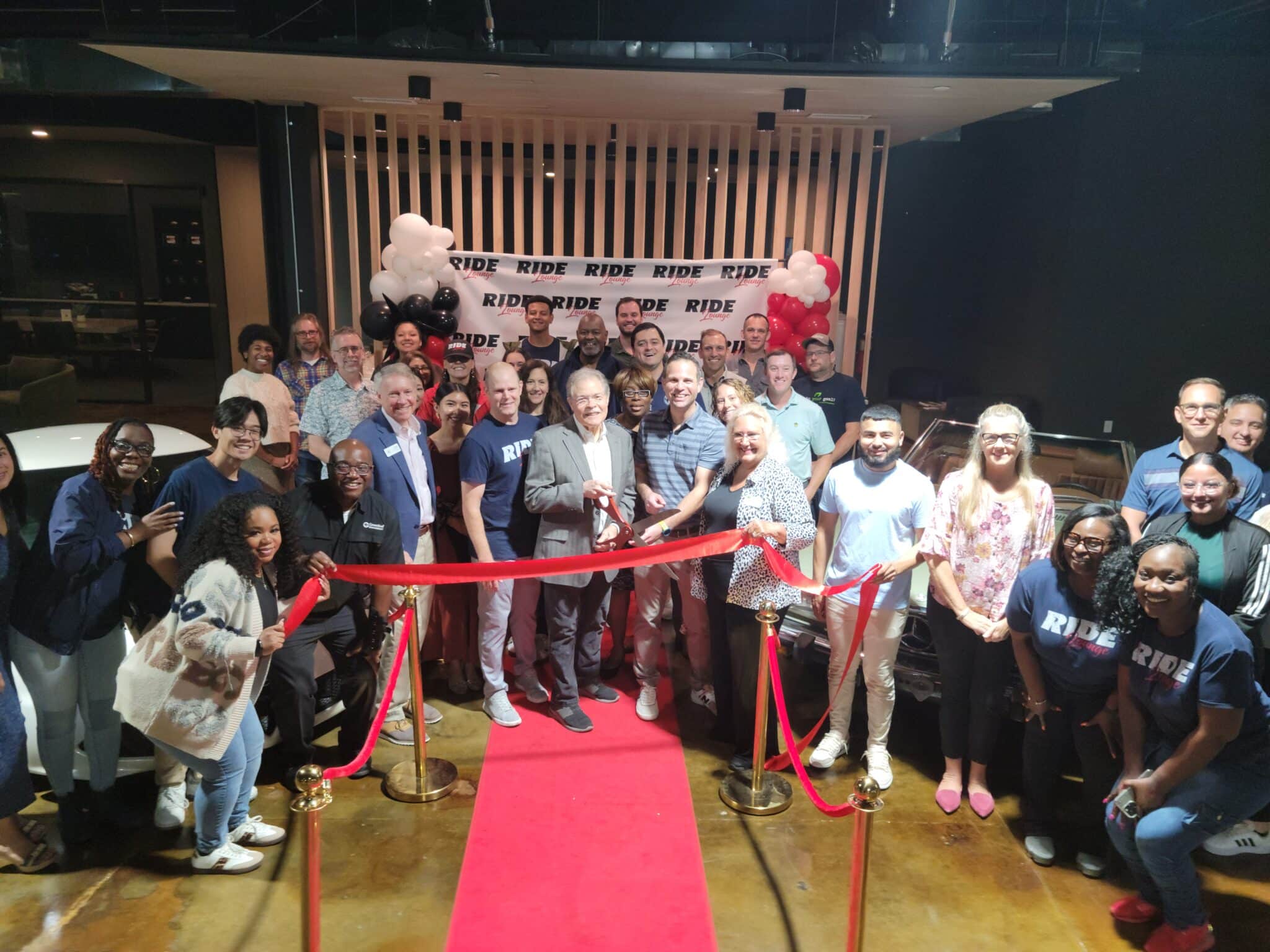
The Peachtree Corners Business Association and the City of Peachtree Corners officially welcomed Ride Lounge, one of the city’s newest businesses, with a morning ribbon cutting ceremony on May 29.
From 9 a.m. to 10:30 a.m., members of the city and PCBA, along with members of the community, enjoyed mingling, getting to know the Ride Lounge staff and learning more about the unique company.
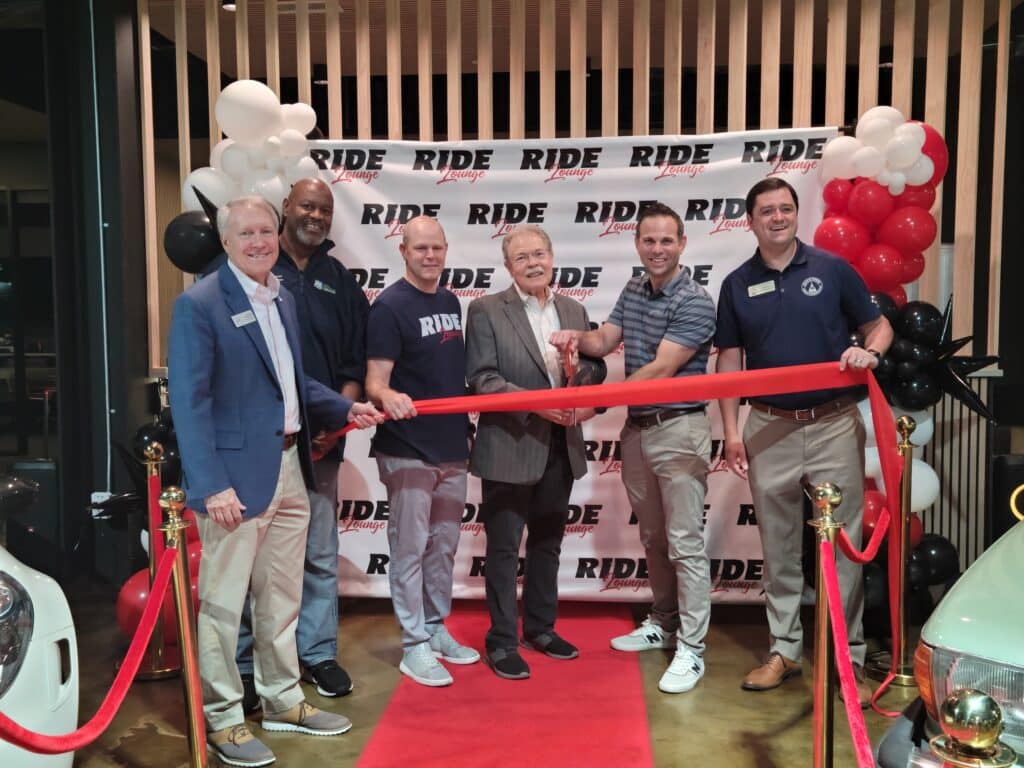
Guests also enjoyed a light breakfast spread of bagels, fresh fruit, coffee and juice and brief speeches from featured guests.
Welcoming the business
Lisa Procter from the PCBA spoke first and thanked Ride Lounge for being part of the PCBA and the Peachtree Corners community. She also recognized the collaboration between the organization and Ride Lounge in hosting the ribbon cutting.
“The PCBA was proud to coordinate with Ride Lounge and the community to make this event a success,” Procter shared.
Mayor Mike Mason followed Procter in addressing the crowd and talked about the state of business in Peachtree Corners and how companies like Ride Lounge help make the city a great place to live and work.
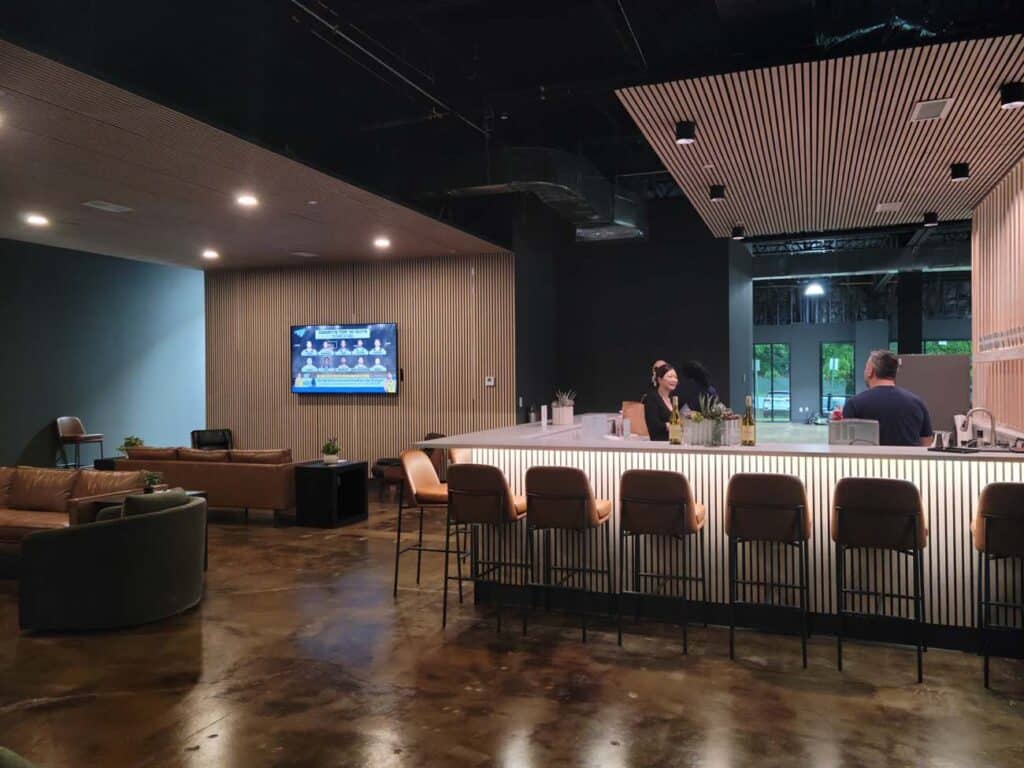
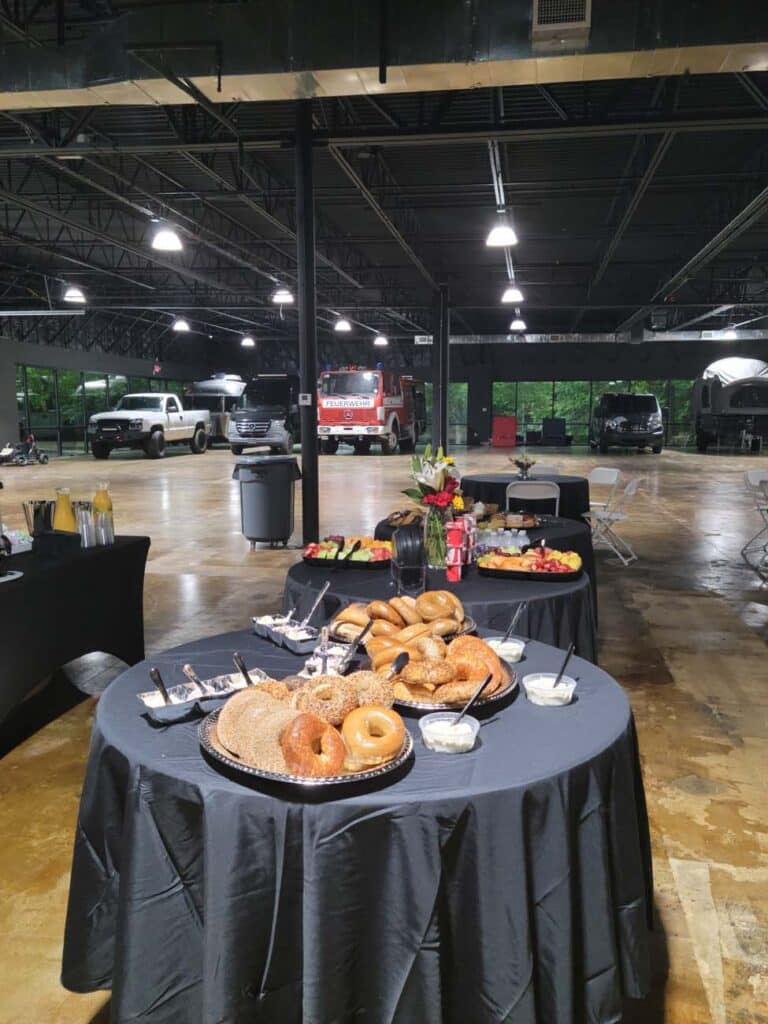
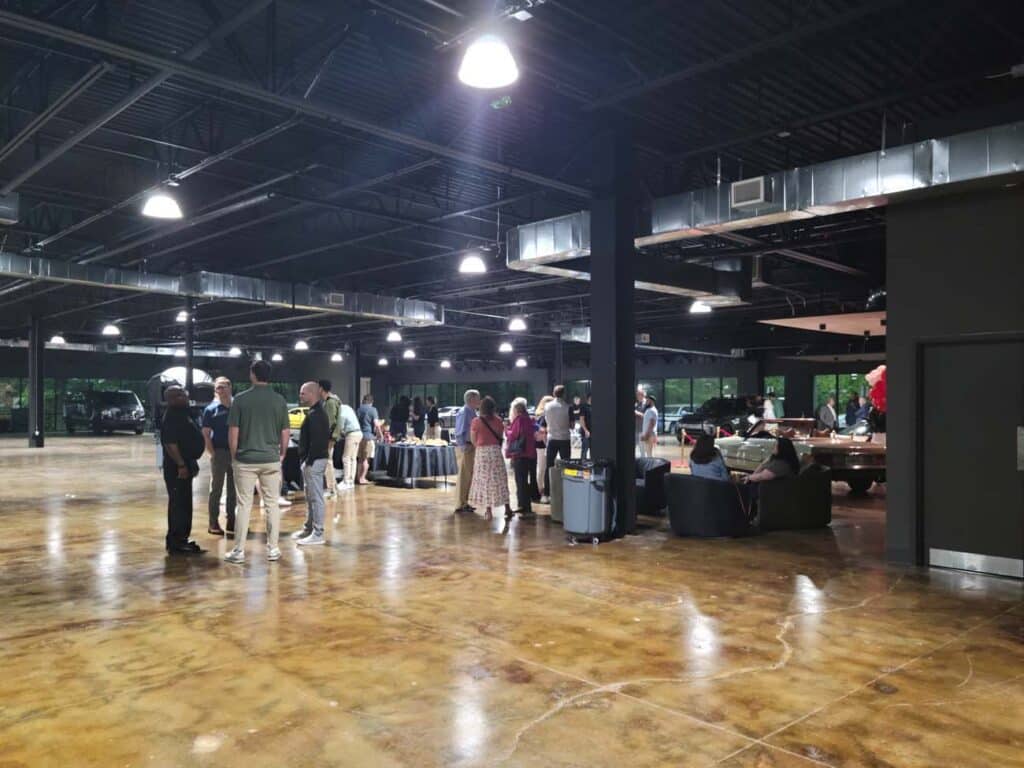

Dave Codrea and Josh Friedensohn, founders of Ride Lounge, then thanked everyone for coming and shared a little about the company and their vision.
The cutting of the ribbon and photos followed the brief speeches. Afterwards, the crowd was invited to tour the space and spend more time chatting and networking.
About Ride Lounge
The Ride Lounge is more than a car storage facility, it’s a place that celebrates car culture; where car enthusiasts can meet to discuss their passion and show off their vehicles.
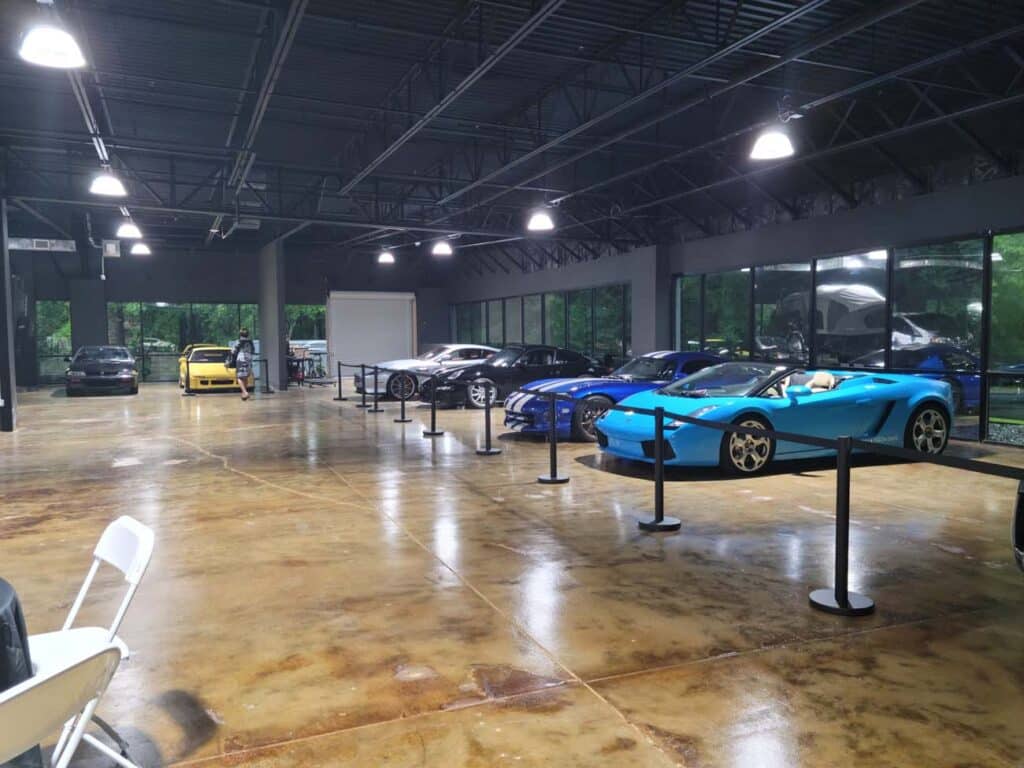
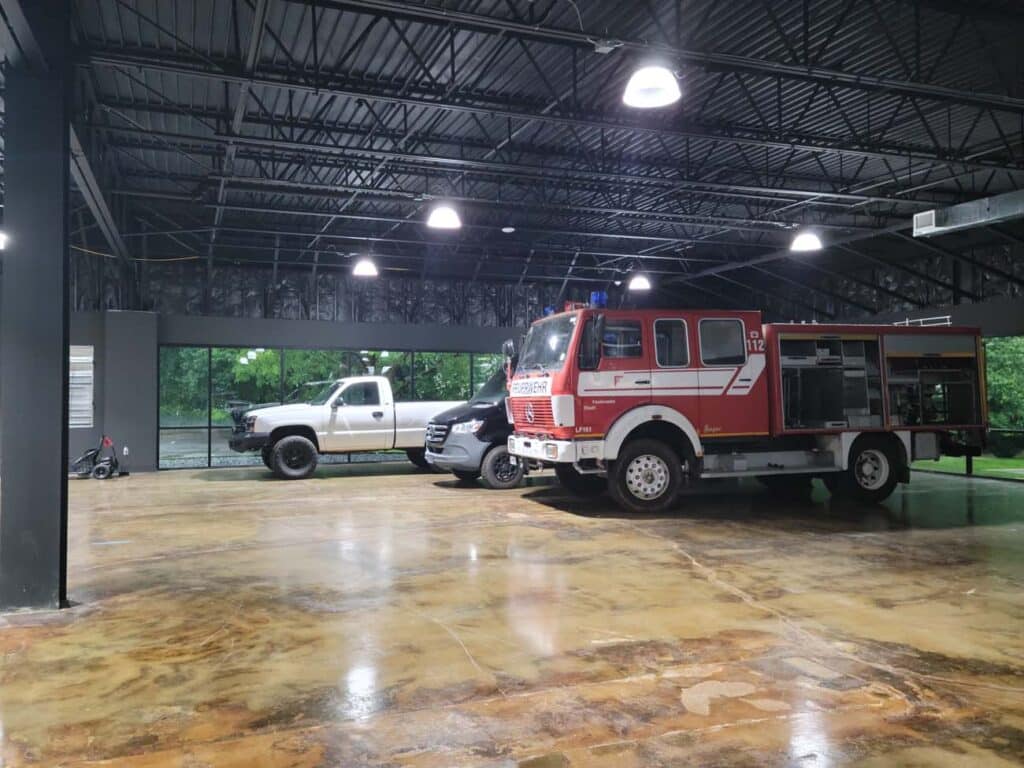
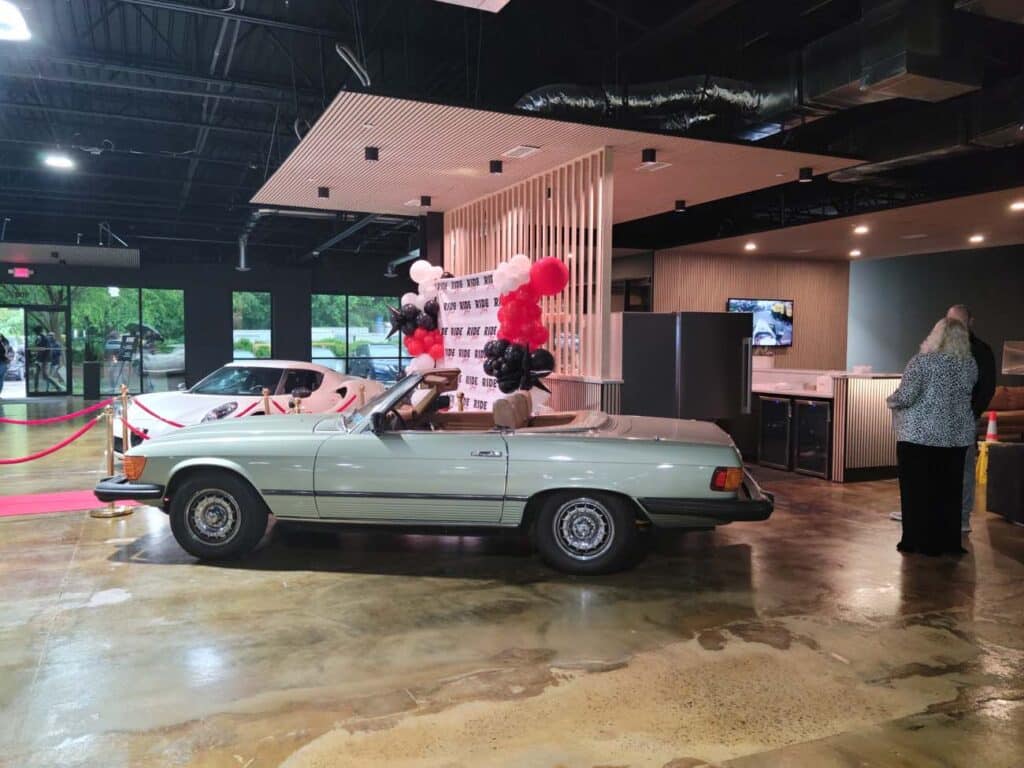
Founders Dave and Josh wanted to create a welcoming community that people would trust to store their vehicles, but that would also offer a club-like atmosphere and host fun, car-centered events that the whole family could enjoy.
Ride Lounge’s 20,300-square-foot facility is comprised of 58 parking spaces with the potential to include car lifts in certain areas. There are cozy seating areas, a meeting space and kitchen area so members can hang out, relax and talk cars.

Designed for cars that are driven and enjoyed by families, Ride Lounge has room to hold up to 400 people for special events and activities.
To learn more about Ride Lounge, visit ride-lounge.com.
For more about the PCBA, visit peachtreecornersba.com.
Related
Business
Music Matters Productions Expands Peachtree Corners Headquarters
Published
2 weeks agoon
May 21, 2025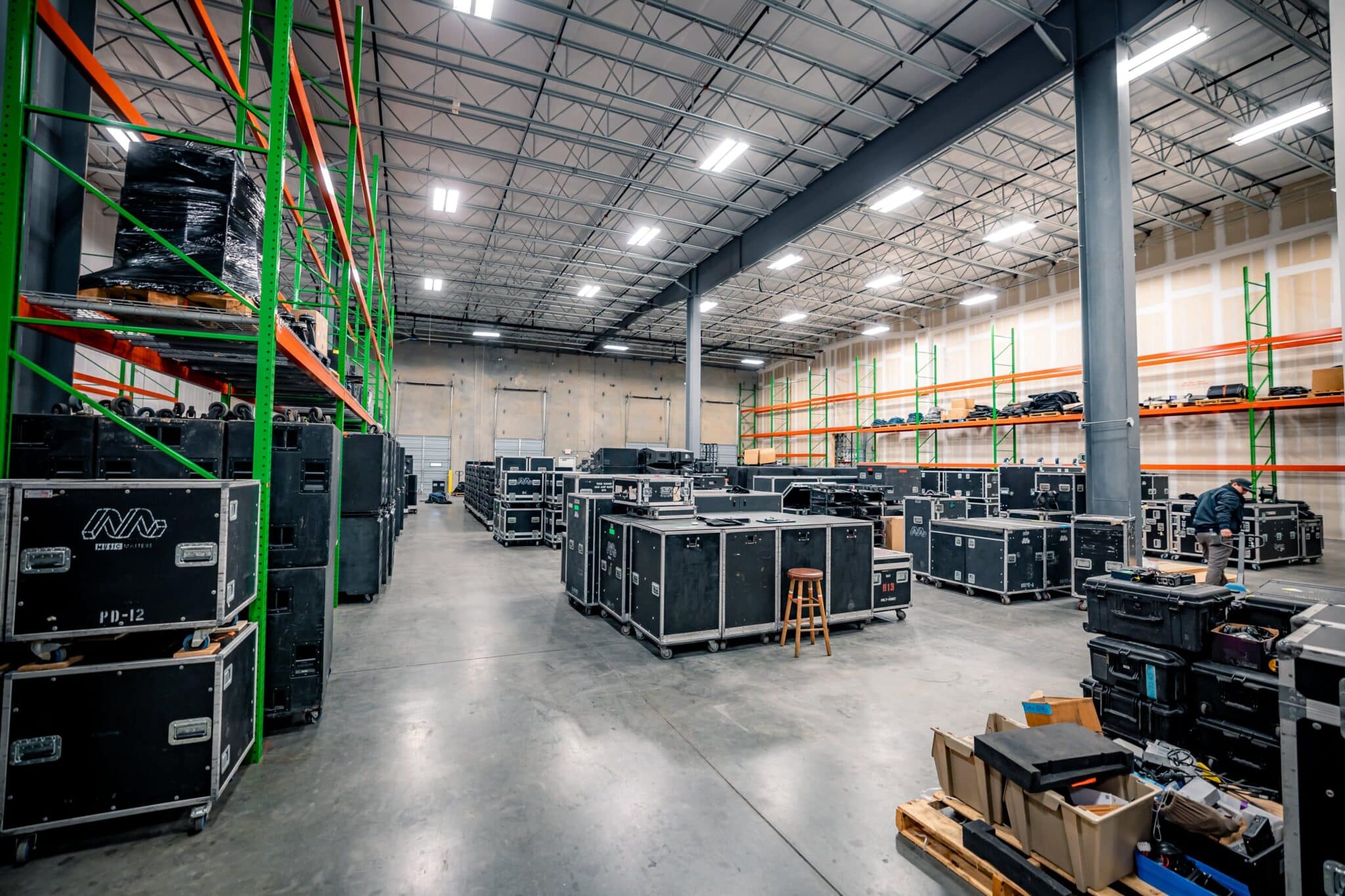
Company adds 20,000 square feet to meet growing demand
Music Matters Productions (MMP), a premier provider of audio, lighting, video, staging and rigging solutions, has expanded its metro Atlanta headquarters, increasing the total warehouse footprint from 40,000 to 60,000 square feet.
In addition, MMP has opened a second 10,000-square-foot building directly across the street to house its growing corporate production division.
The expansion comes in response to increased demand across touring, festival and corporate markets, as well as the continued growth of MMP’s high-end gear inventory. With a fully dedicated shop for each department, including audio, lighting, video, rigging and staging, the new layout provides more space for show prep, pre-rigging and crew coordination, allowing for even more efficient load-ins and streamlined execution.
New features
The rigging department now features a new mobile motor hoist test stand, allowing for in-house motor certification, a service that’s now available to external clients in the production community.
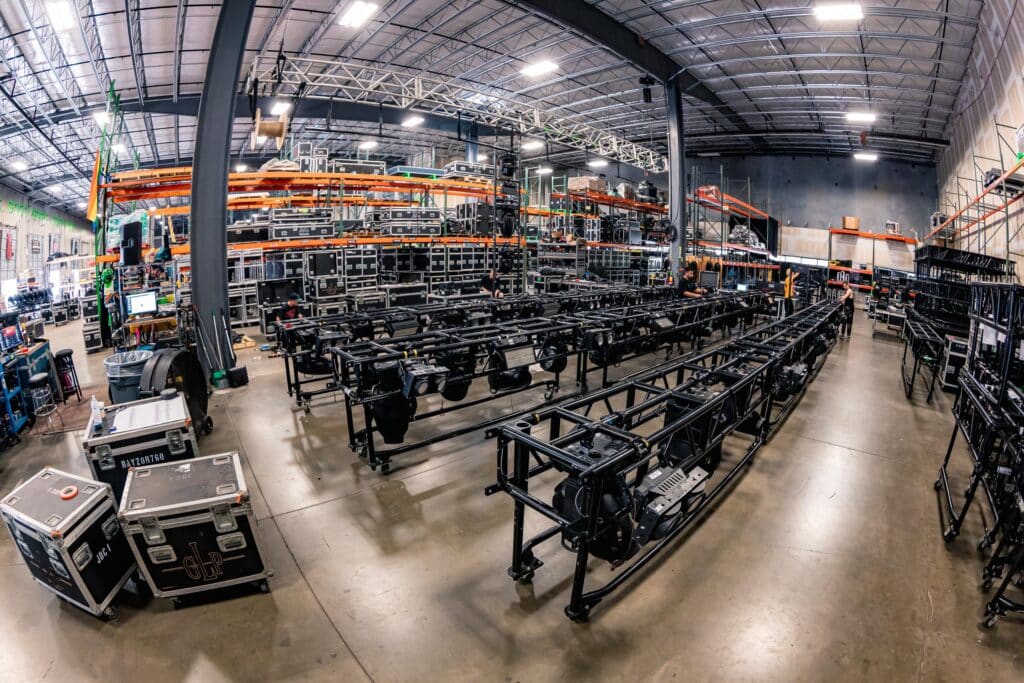
Five new truck bays were added in the process, as well, bringing the total number of bays to 17 — an important upgrade for MMP’s fleet and the increasing number of shows moving through the warehouse each week.
“This growth is a direct reflection of the work our team puts in and the trust our clients place in us,” said Aaron Soriero, owner of Music Matters Productions. “We didn’t expand for the sake of being bigger, we expanded because we needed the space to do the job right. More room means tighter prep, faster turns and better support for our clients.”
Expanding operations
The expanded warehouse and building across the street include additional offices, mixed-use areas and a dedicated repairs department, giving the team more capacity to prep, collaborate, QC and scale for increasingly complex events — both corporate and entertainment.
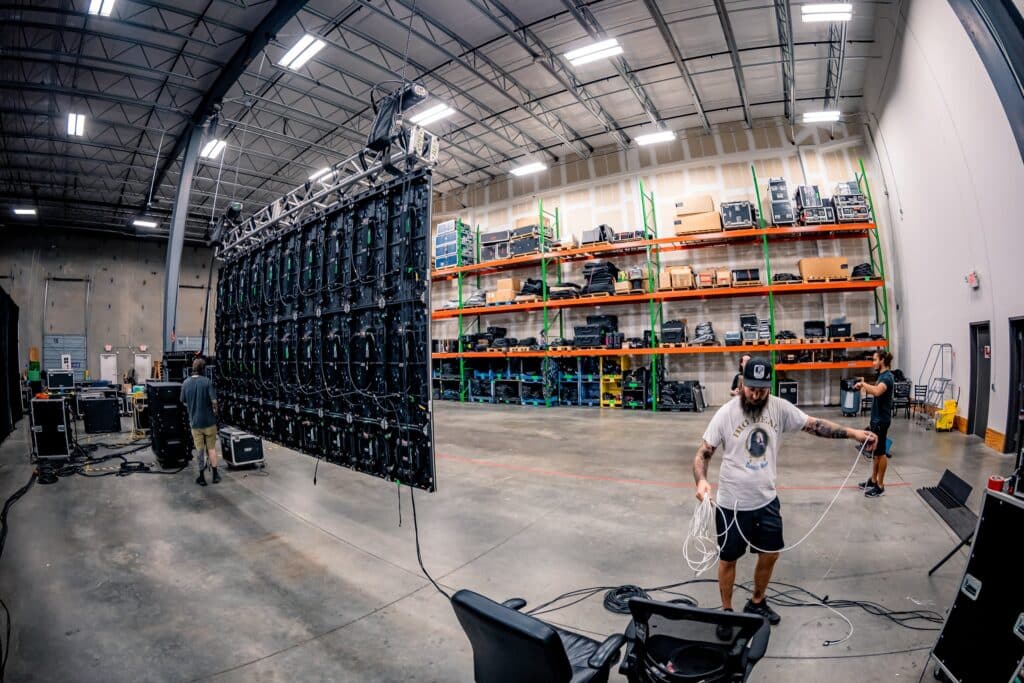
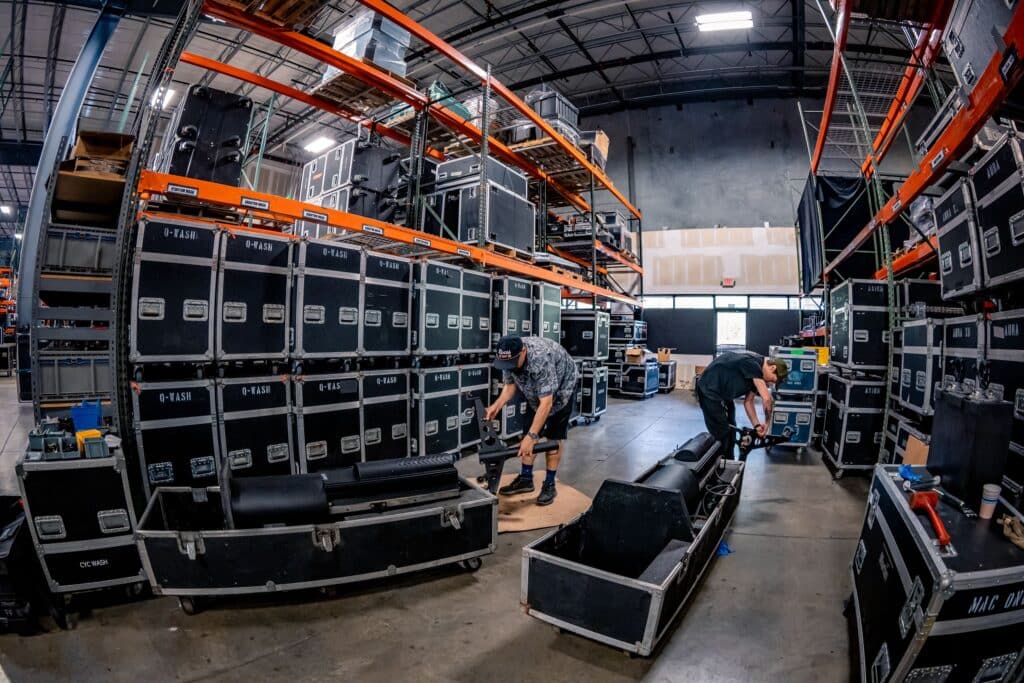
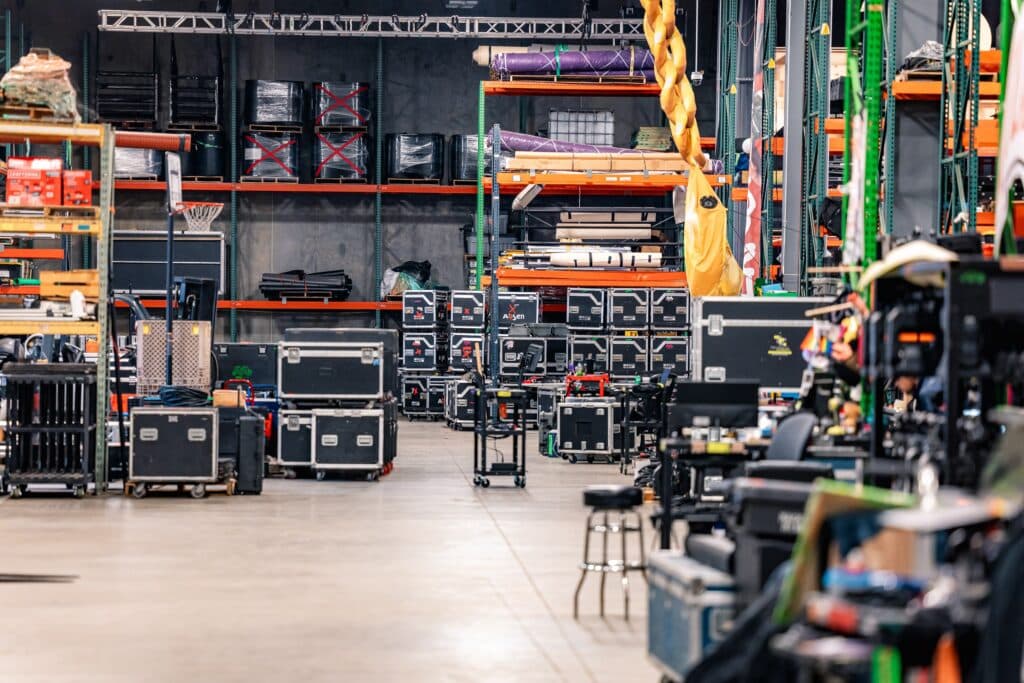
With a reputation built on reliable gear, experienced crews and an enhanced client experience, MMP continues to solidify its role as a go-to production partner for events of every size and setting — whether it’s a beachside festival, a stadium tour, brand activation or a high-stakes corporate show.
About Music Matters Productions
Music Matters Productions is a full-service live event production company based in Peachtree Corners, Georgia, providing industry-leading audio, lighting, video, rigging and staging solutions for tours, festivals, brand activations and corporate events across the country.
Known for its high-end inventory, seasoned crew and deep dedication to doing the job right, MMP supports hundreds of productions each year and is trusted by clients nationwide.
For more information, visit mmp-atl.com.
Related
Business
From Boardrooms to the Himalayas: Vandana’s Journey to Purpose and Growing with Intention [Podcast]
Published
3 weeks agoon
May 19, 2025
How one family blends operational clarity, conscious leadership, and community-driven values to grow their business — together.
In this episode of UrbanEbb, host Rico Figliolini chats with Vandana Aggarwal, VP of Operations at Aggarwal Real Estate, about the winding road from global consulting to family-run commercial real estate in Norcross, Georgia. With honesty, warmth and insight, V shares how she went from working 80-hour weeks in corporate strategy to rediscovering clarity in the mountains of India — ultimately helping transform her family’s business into a community-driven real estate firm managing over 50 shopping centers.
The conversation weaves together themes of leadership, legacy, operational excellence and the transformative power of both AI and yoga. It’s a story about clarity, courage and conscious growth — both in business and in life. This is another episode you won’t want to miss.
Episode Highlights
- Why Vandana left a high-powered consulting career to join her family business
- How hiking Kilimanjaro and studying yoga in the Himalayas changed her leadership mindset
- The operational overhaul she brought to Aggarwal Real Estate to support growth
- What it’s like working side-by-side with your dad, siblings, and 700+ tenants
- How the company rebranded with intention and built a mission around “building communities as a community”
- Where AI is reshaping real estate—from lease drafting to property management—and where it still can’t compete with people
- Leadership succession planning with siblings at the helm
- The importance of clarity, calm, and conscious growth in both business and life
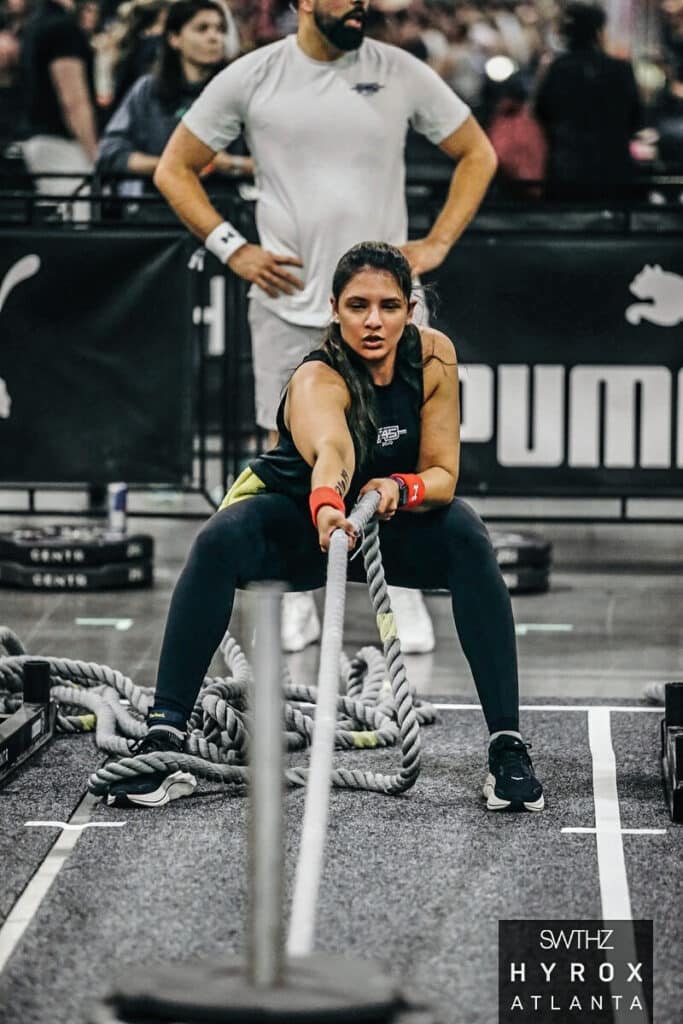


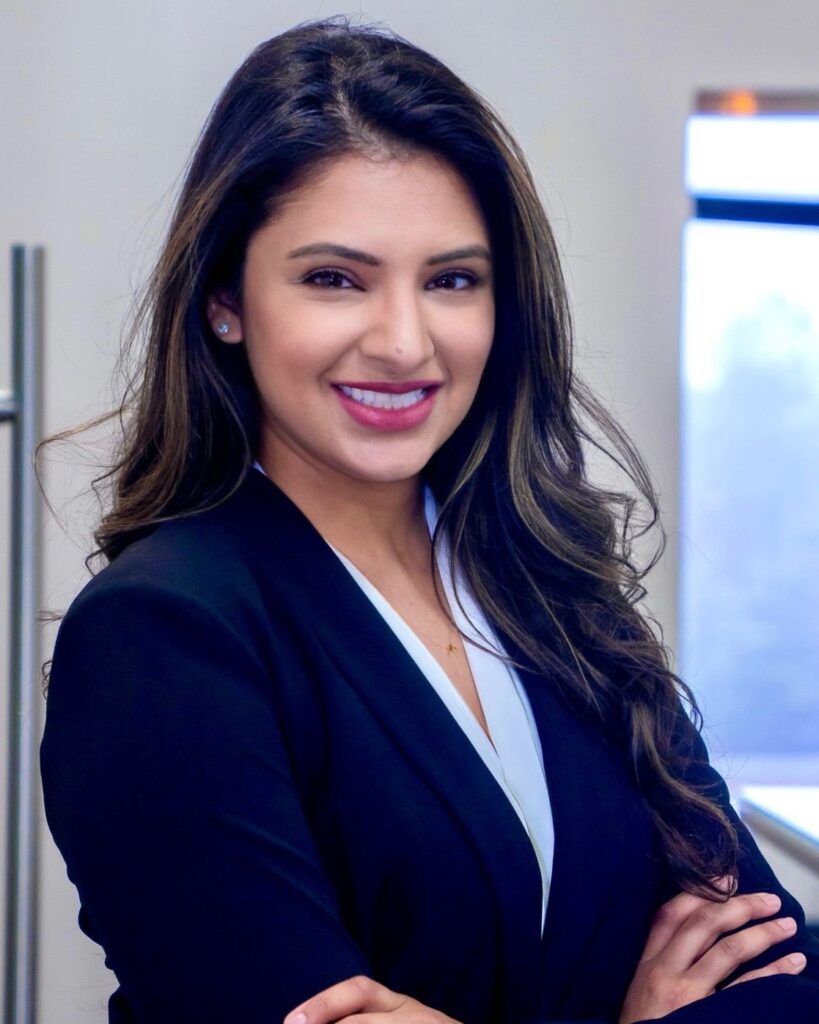




About Vandana Aggarwal
Vandana Aggarwal is the Vice President of Operations at Aggarwal Real Estate, her family’s commercial real estate investment and management firm. She brings a unique blend of strategic insight and operational excellence, shaped by her early career as a consultant at A.T. Kearney, where she advised Fortune 100 to 500 companies. A graduate of Georgia Tech, she also took a transformative detour from the corporate world to spend a year in India teaching yoga—an experience that continues to influence her leadership style today. At the core of her work is a deep commitment to family and a passion for building strong, connected communities.
Timestamp:
00:00:00 – Introduction and sponsors: Vox Pop Uli & EV Remodeling
00:03:12 – From Georgia Tech to global consulting
00:04:23 – Leading strategy for Fortune 500 companies
00:06:11 – The role of vision alignment at the C-suite
00:08:01 – Sabbatical becomes family business overhaul
00:09:35 – Bringing operational excellence to a growing real estate firm
00:12:02 – A year of yoga, nature, and healing in India
00:17:03 – Hiking Kilimanjaro, testing limits, and expanding self-trust
00:18:52 – Navigating family dynamics inside a business
00:21:56 – Planning for leadership transition: siblings, strategy, succession
00:24:06 – Rebranding the business: from American Management to Aggarwal Real Estate
00:26:33 – Where AI fits (and doesn’t) in real estate operations
00:30:04 – Legal, leasing, HR, and marketing efficiency with tech
00:31:01 – Community-focused retail and experiential shopping centers
00:32:00 – Reflections on AI, journalism, and digital trust
00:32:57 – Closing thoughts
Podcast Transcript
00:00:00 – Rico Figliolini
Hi, everyone. This is Rico Figliolini, host of UrbanEbb. This podcast comes out of the city of Peachtree Corners, and we have a special guest today. And if I don’t mess up the name, it’s Vandana Aggarwal.
00:00:15 – Vandana Aggarwal
Absolutely. You can call me V, Rico.
00:00:15 – Rico Figliolini
I’m going to call you V, trust me. And I’m Rico Figliolini, so a bit of a long name there. But V is VP of Operations of Aggarwal Real Estate here, based in Peachtree Corners? No, Norcross.
00:00:30 – Vandana Aggarwal
In Norcross, yeah. Norcross, Georgia.
00:00:32 – Rico Figliolini
Yeah, yeah. Just off 85, and?
00:00:34 – Vandana Aggarwal
Jimmy Carter.
00:00:35 – Rico Figliolini
And Jimmy Carter.
00:00:36 – Vandana Aggarwal
We’re completing each other’s sentences already.
00:00:39 – Rico Figliolini
But where are we doing this? We’re doing this from one of our great sponsors, one of our two great sponsors, Vox Pop Uli. Was this tastefully obnoxious? Let me tell you, I asked them to do a corner cut for us, and this is perfect. So they have the Moxie logo and stuff. So they’re branding, right? Same way they can brand your stuff. They’ll put your logo on anything. They’ve done, I think, 6,000 vehicle wraps. They’ve done garments, obviously. They could do one-offs or they could do 1,000. They do trade show booths, wraps, everything. So anything you need a logo on, think of what object you want it on. They’ll figure it out for you. And if you’re doing, let’s say, 5,000 mailers and you want that database customized for each postcard, they could do that also. It’s called data. I forget what it’s called, but they can do that. They can work the data into the printing as well. So all customizable. Check them out, voxpopuli.com. Now, getting to something we were talking about, hands-on stuff, which is this also. This can’t just be done by machines, right? Although machines, you still need people. But EV Remodeling Inc., they are a remodeling company. They can do design to build. They can do whole house renovation. They can create your deck, your backyard gazebo. They can put a bathroom, kitchen, anything you want. EV Remodeling Inc. is owned by Eli and his family. Lives in Peachtree Corners. It’s based out of our city. They’ve done, I think, over 250 homes recently. So check them out, evremodelinginc.com. And I want to thank both of them for being great sponsors of ours. So, it’s always a long stretch doing that, but I’m glad to have you, V.
00:02:22 – Vandana Aggarwal
I’m happy to be here. Thank you for inviting me onto your podcast. Excited to chat with you.
00:02:25 – Rico Figliolini
Yeah, no, this is cool. Well, you know, I met you, where did I meet you at? I think it was the chamber.
00:02:30 – Vandana Aggarwal
Yeah, the Southwest Gwinnett Chamber event.
00:02:32 – Rico Figliolini
Yeah, and we were talking a bit, and I was like, damn, you know, I had my father owned a business, and he wanted his kids to be in it. None of us, none of us could go into that business. It’s a little difficult, different industry. It was a hard industry, plus my father was very patriarchal, very over-demanding. God bless him. He mellowed in age. But when you were telling me about your family, I mean, your father, your mother, your sister, your brother, and you, I mean, all in it. It’s amazing.
00:02:55 – Vandana Aggarwal
We’re all together. We’re the modern-day Brady Bunch.
00:03:03 – Rico Figliolini
I love it. Yes, that’s exactly it. But, let’s start a little bit. I mean, you were telling me, I mean, you came from a consulting world. You came where you were actually being paid a lot more than you’re being paid right now, actually.
00:03:12 – Vandana Aggarwal
I told my father he couldn’t afford me when he recruited me out. So I graduated from Georgia Tech in 2007. I actually did join his company right out of college for two years, learned a lot about the company. He actually had me go through a rotation in every department of the company to learn more about what we did, how we operated. And I think very quickly, it was also 2008-9 with a recession. But I was also very interested to learn how big companies operate. How can you take a small company at that time? We were much smaller than we are today and really understand how do you go from this, which is where everyone starts, right? As a new company to get to be one of the largest in the nation, in the world and see how they operate, how they grew it from, you know, a mom and pop business to this global enterprise. Consulting was a natural transition to learn about multiple companies, multiple industries. So transitioned into AT Kearney, which has now been rebranded as Kearney, and out of their Chicago office. So I was there for seven to eight years, almost eight years.
00:04:23 – Rico Figliolini
Entry-level position you got in?
00:04:24 – Vandana Aggarwal
Yeah, I went in as an analyst. The good thing with that experience was by the time I left, I was a senior manager with Kearney. I worked across 17 different companies in those eight years. So I got to experience how CPG companies, retail companies, transportation, IT, you name it, I’ve done it. In terms of the different types of industries I got to work with, worked with a lot of Fortune 100 to 500 companies at the C-suite level. So we were coming up with all kinds of strategy projects such as new market entries, mergers and acquisitions. A lot of what I ended up specializing in in those seven years was operational efficiency and growth strategy. So it was an amazing, I’m grateful for that learning experience, the you know the caliber of minds that you work with. You also get to experience what the C-suite looks like. How does the very top operate and then it goes from the top down right? So it is very much led at this very top leadership and you see how companies change in their culture the way they operate based on how the top is designed.
00:05:38 – Rico Figliolini
So did you see good and bad at the top?
00:05:41 – Vandana Aggarwal
Absolutely. And I’m not going to name names. But you learn a lot when you see how your CEO and your C-suite right below them, the culture they’re bringing into a company and their vision and their goals if they’re aligned, unaligned. Anyone that at the very top have different viewpoints of where the company has had it is where companies start to break apart, lose revenue, lose their you know people, which is very important.
00:06:11 – Rico Figliolini
Where did you see the pain point then? What was the common denominator I guess of those?
00:06:18 – Vandana Aggarwal
There’s no one common denominator, but if I had to kind of narrow in, it comes down to what is our five-year, ten-year trajectory? Where are we headed? As large companies grow, you’re not just in one industry. You’re not just doing retail shopping centers. You’re investing in all kinds of properties just to bring it back to our company. Similarly, a CPG company can make all kinds of products, so they have to decide what it is because you have to be concentrated on the right places. If you have a leadership team that is in alignment of what that ultimate goal is, right, then you have clear strategies and, you know, metrics you’re measuring your success against. So that was a big thing that I learned. Also just, you know, seeing how great leaders operate, right? Some of the best in the nation today, I got to be in the room with them and just to see how they lead is very important.
00:07:14 – Rico Figliolini
Did you see any family dynamics in any of those businesses?
00:07:20 – Vandana Aggarwal
No. You know, there may have been like a father-son duo, but when you’re looking at the very top, I won’t say it was like all in the family, right? You know, and it also becomes the size of a company, right? You know, when you get to an international scale, you’re not always blessed that every person in your family has the right skill set and experience to fill each role on that C-suite.
00:07:46 – Rico Figliolini
I’m just thinking Trump for some reason. Every kid has a job.
00:07:51 – Vandana Aggarwal
Every kid has a job.
00:07:52 – Vandana Aggarwal
You had the accent, right?
00:07:54 – Rico Figliolini
Pretty much, I guess. So after the C-suite or expansion, you traveled a lot too, I think, right?
00:08:01 – Vandana Aggarwal
I did, yeah. So after my seven, eight years in consulting, I was reaching 30. And Shiv, my father, came to me and he said, you know, you’re doing this for a lot of outside companies. Why don’t you help us grow and bring your expertise home? And I said, look, I’ll take a sabbatical. Let me assess the company. And after that period where I took a short sabbatical to come look at how we were operating, I said, I can give you three years. I said, you can’t afford me, but I’ll give you three years of my time. And I said, I think it’ll be the right, it was the right time in the company. We were investing very heavily. We were bringing in a lot of new square footage into the company, and we weren’t designed to manage it. So we as a company, as you know, we are the investors. We have an in-house management company, an in-house leasing company. So as we acquire new properties, our team does the management for those properties in-house. We don’t provide third-party services today. And we do the leasing in-house. But at that time, when he, you know Shiv started we had one or two and now we’re at 50 shopping centers plus and other investments that we have. And there’s a very different way you operate you know and how do you how does the CEO go from being an operator to where he’s overseeing it, but he’s not into the weeds right? So he has create a system for that to happen right? You have to have standard operating processes for your property managers, your accounting team, your marketing team.
00:09:35 – Rico Figliolini
And you quite didn’t have that before.
00:09:37 – Vandana Aggarwal
We didn’t, no. And, you know, and I think that’s why he wanted to bring me in is because my strength is operations and I love it. I love going into messy places and cleaning them up.
00:09:49 – Rico Figliolini
Is that what you did when you were a consultant?
00:09:51 – Vandana Aggarwal
A lot of what I was concentrating on at the end of my consulting career, yes. So I did a lot of operational efficiency work. So we’d go in, assess the way companies were designed. And we’d interview hundreds of team members to understand what their role is. You know, what are they responsible for? How are they delivering? What are they measuring for success? And then we’d redesign the way they did that based on, again, bottom line, what are your ultimate goals for the company?
00:10:21 – Rico Figliolini
So you had to understand that before you got to that point. And you’re not making the decisions, the C-level.
00:10:29 – Vandana Aggarwal
Present, right? And similarly even with Shiv, when I first joined, I said, look, this is how I think we need to redesign the company from a bottoms-up perspective based on ultimately our goal of growth, doubling, tripling in size over the next ten years. And I think this is where the father dynamic came in. I guess he trusted me. And he said, do it. He just said, do it. And it was beautiful because right when you’re with large companies, it’s a lot of time before you get. Those decisions made and that trust, right? And so it was great. And he said, yeah, just put it into place.
00:11:07 – Rico Figliolini
See, that’s a great dad, actually. Some dads would be like, I don’t know about that daughter or son or whatever.
00:11:16 – Vandana Aggarwal
It did take time, though, like to ultimately, he was in the operation so heavily. And, you know, until today, I’m still like, step up, step up. Like, I need you to not get into the weeds. Like I think at that time we had tenants calling him, maintenance guys calling him. Like every little and big problem would go through his cell phone. I said, you’re too smart and you’re such a good investor. This is not your skill set. You shouldn’t be managing this. You need to bring people on who are expertise in this area. And I said, you need to be focused on like the larger plan.
00:11:51 – Rico Figliolini
This way you can grow it better.
00:11:51 – Vandana Aggarwal
Which I think has been very successful over the last eight years I’ve been with him now.
00:11:57 – Rico Figliolini
So before you got to him, though, you were traveling a bit internationally as well?
00:12:02 – Vandana Aggarwal
Yeah, yeah. So this is an amazing year. I was very burnt out. By the time I left consulting, I was working 70 to 80-hour weeks, traveling Monday through Thursday, if not more than that, of the week. So I told Shiv, I was like, I’m going to take a month. I’m going to go to India, get my yoga certification. No intention to teach at the time. I just said it’d be a great one-month retreat. And I was up in the mountains like Himalayas and India in a city called Dharamshala. Beautiful place. One of my favorites in the world. And I just, I think I needed it for myself emotionally, mentally to take that break. So I turned one month into one year. I didn’t know it was going to be a year.
00:12:49 – Rico Figliolini
In that same city? In that same town?
00:12:50 – Vandana Aggarwal
Yeah, so I ended up the school that I had gotten my certification with. I asked them, I was like, do you mind if I hang around for a little while? Like very casually, I’m like, you know, I’ll pay for my room and board, but I just want to be around this group and this energy. And they said, well, if you’re going to be here, why don’t you intern? And they’re like, room and board is free if you intern. I was like, sure. You know, not thinking what it was leading to. This is like that beauty of the universe coming into play. Yeah, so I started teaching, ended up loving teaching. So then I ended up teaching the 200-hour yoga training course. And I was in Dharamshala for four months. And then I moved down to Goa, their Goa campus for another six.
00:13:30 – Rico Figliolini
Where is that? Goa?
00:13:32 – Vandana Aggarwal
Goa? It’s in southern India on their west coast. It’s a beach town. Yeah. So I had the mountains and the beach. But I’m a mountain girl. I’m a hiker. But no, it was a beautiful experience. Very different from anything I’ve done with my career, right? But I became a yoga teacher for a year.
00:13:52 – Rico Figliolini
Did that clear your head? Yoga, they say, can do that, right?
00:13:53 – Vandana Aggarwal
Yeah, it’s all the tools of yoga, right? The meditation, the breath work, really getting internal, going in, right? Just going inwards, being quiet, which we don’t have. We have a lot of noise in our life today, you know? And naturally, right? Between family life, work life, social, and then just all of the noise from everything else right? Like we’re sitting here and I can hear the cars right? So you know that difference was when I was sitting there, I could hear the ocean waves and so there’s something very healing in nature naturally. So it was the tools mixed with nature and I still think nature has a very strong healing power on us. So whenever I can, I try to get out on a mountain and by the ocean. But yeah no it was it was a beautiful experience but it did bring a level of calmness into the way I approach things. It changes your perspective of you know at the end everything’s okay. No matter what you’re going through it’s temporary you’re, and everything that’s happening to us is happening to us for the good. We don’t know it, sometimes it seems like a bad situation in the moment, but ultimately you know, universe, God, whatever you believe in is at play to bring you something better in your life. And you just have to step back to understand what is it delivering us.
00:15:19 – Rico Figliolini
I like the way you think. My wife every once in a while would say, aren’t you upset about that? I’m like, I think come tomorrow, it won’t mean anything. There’s no point in, just relax. Not everything, two days later, it’s not as important as it seemed at that moment.
00:15:37 – Vandana Aggarwal
Yeah. And it’s not just that it’s not as important. It’s also like…
00:15:41 – Rico Figliolini
In perspective?
00:15:42 – Vandana Aggarwal
It’s, what am I gaining from this? Like, what can I gain from this? Oftentimes when, you know, a lot of things happen, yeah, like you get hurt or, you know, it’s like in relationships, right? Or if you have a bad business deal, right? It’s like, hey, how am I growing, right? And I think that’s what makes life very exciting, right? Otherwise, if you’re always living on a high, is it a high?
00:16:06 – Rico Figliolini
Yes. So I’m thinking you were a consultant for seven or eight years. 80 hours a week. And all of a sudden you’re doing yoga on the mountains of India. It’s just like, it’s almost like a movie. It’s almost like…
00:16:18 – Vandana Aggarwal
Eat, pray, love?
00:16:19 – Rico Figliolini
Yes.
00:16:20 – Vandana Aggarwal
It was my eat, pray, love moment for a year.
00:16:23 – Rico Figliolini
That’s amazing.
00:16:24 – Vandana Aggarwal
No, you meet amazing people, but I think we were meant to meet everyone that we come in interaction with on a daily basis. You naturally have a connection. There’s a universe at play, and we were meant to cross paths and learn something from each other, gain something from one another, give to the other person. And I think you just have to look at life that way.
00:16:48 – Rico Figliolini
I definitely think along that way. I mean, I definitely think each of us nudges each other in a crowd a little bit. That one nudge can set you off going in a different direction. So I totally believe in that. So you joined your dad. Yes. And you’re, so actually, even before we get there, so yoga, but what other interests have you been?
00:17:03 – Vandana Aggarwal
Yeah. So, I mean, I’m an avid hiker. I’ve done recently in the last few years, I’ve climbed Kilimanjaro. I did the Machu Picchu trail. I’ve done a few 14ers out in Colorado, but I like to test myself physically. You know, just, again, it comes down to how do we find that push within us past our comfort zone? So is this a physical inability or is it a mental constraint? So to get past that mental constraint of discomfort and then really push yourself to the next level and say, I can achieve something. It’s not going to be easy. So to me, if I’m on a hike and it’s not hard, I’m like, well, was it a hike? Like it didn’t test me, but no I think, you know.
00:17:55 – Rico Figliolini
You should do the Appalachian Trail. That’s like 2000 plus miles.
00:18:03 – Vandana Aggarwal
I know. And it is, you know, it’s not just like the hiking part. It is like living out in nature and, you know, sleeping in uncomfortable conditions. Yeah. Walking in the rain. It’s cold. I think the last day of our Kilimanjaro hike, it was negative 20 degrees up in the mountain and my eyelashes were frozen and I couldn’t feel any part of my body. And, you know, and it tested my breathing. And there is that element of push yourself to the point that it’s not your ego anymore. Like if your body’s saying stop, you have to stop as well and respect your body. But yeah, to really test yourself.
00:18:38 – Rico Figliolini
To circle all that back now, you’re back home. You’re working with your father and your family. A lot of businesses grow or die because of family. If it’s a family business, right?
00:18:52 – Vandana Aggarwal
Absolutely, yeah.
00:18:53 – Rico Figliolini
So you have your highs, your lows, your, sometimes you don’t get along. Sometimes decisions are split. People get upset with each other. So you’ve been at your highs and lows physically and mentally doing other things. Has that helped you in some ways? Not that you’re having a bad time with family. Because it sounds like you all fit just fine, like the Brady Bunch.
00:19:15 – Vandana Aggarwal
Let’s keep it that way. No, I mean, there’s multiple dynamics at play. It is a family business. My father is also my boss. My siblings are also my friends and my coworkers. And it’s about no matter how hard you try, you cannot separate those relationships. There is an interplay of all of it when you spend eight to nine hours a day together. But we all have, again, a common goal for the company. And then a common goal for our personal relationship. So when we sit down, we keep in mind that we like each other and we want to keep it that way. Like very simply put, that’s first and foremost for me especially. Even when Shiv had brought me in, he said, oh, can you manage everyone? And I said, I’ll manage everyone but my brother and sister. I said, you know, like I won’t jeopardize the relationship I have with them as a sibling by being their manager. Especially because I said that’s your job like good luck. But not just that it’s you know we all have different skill sets so I said how do I manage my brother who is a genius he’s a CPA by trade you know like I can’t tell him how to run the financials of this company like he’s supposed to teach me that right? And same way I teach him that. My sister has a master’s in marketing right? She is by far the most social, likable person you’re going to meet, and she knows how to work with people. I said, she needs to teach us that. So I think we’re lucky that each of us, and this is, I think, rare, where you have three kids and each one of them has their own skill set. That, I think, helps us stay in business and we see ourselves foreseeably into the long-term future being in business together is because we each bring something very unique to the table. Ultimately we value the relationships that we have on a personal level as a family above all else right? And then you know the element of like, how does the yoga experience a hiking experience teach us. That’s, it’s not specific to anyone’s situation, I think it’s a baseline of who you become right? The foundation. Like it teaches you patience, it teaches you again, everything is temporary so let’s not get overly attached emotionally or get upset or too joyful, even like, let’s just stay neutralized on any situation because it will end. And then the next one will come up and kind of flow with the ebbs and flows of the ocean. You, you flow with everything that comes with you, comes your way at work, at home. But yeah, I mean, we do sit down as a leadership team. I, my father and my siblings and I, and we talk about, hey, we separately do the exercise. Where are we going to be in five years? What role do we play in that journey? And thankfully, all of ours are very similar in what our goals are. And then we have different skill sets that we bring. So even as we design the future of the company in a moment where my father is not at the head of the table, we’re working on that redesign work. But it’s very conscious. It’s very intentional. Again, we all step back and say, hey, look, how do we maintain, how do we solve problems? Because like, you know, we were talking about how tomorrow we may not agree on something, a big decision. What are we investing in? Come back to, you know, right now Shiv gets to make an ultimate decision because he’s the one leader at the top. Tomorrow it’s going to be three people at the top. How do you deal?
00:23:04 – Rico Figliolini
So is there an exit plan for your dad? Well, not an exit plan.
00:23:09 – Vandana Aggarwal
Not an exit plan. He already has. I think he, you know, he’s gone from, he’s the hardest working person I know. I get that from him. We’re addicted to work.
00:23:18 – Rico Figliolini
80 hours a week.
00:23:21 – Vandana Aggarwal
We love working. You know, this company is his baby. I think I’ve adopted it at this point and we all have. But, to stay mentally sharp, to stay alive, you have to keep working. You have to keep doing something. You have to be working towards something that brings you joy and purpose. And I think, you know, he stepped back to take time towards a lot of his nonprofit work, community work that he’s very much engaged with. But he’s still at the top. He’s still running, you know, his, you know, he’s, you know, not slowing down. You know, we’re constantly growing. We’re growing this year in a large scale, which is amazing, and he’s leading that charge.
00:23:59 – Rico Figliolini
How many properties do you own?
00:24:02 – Vandana Aggarwall
Today we have 50 shopping centers and then a few other assets.
00:24:06 – Rico Figliolini
Is that like 3 million square feet or something? 4 million?
00:24:10 – Vandana Aggarwal
Yeah, over 700 tenants. But, you know, when we sat down a few years ago, we rebranded. Aggarwal Real Estate didn’t exist until two years ago. It was American Management Services. And we had a rebranding effort because we said we want the company’s name and the brand to represent who we are.
00:24:33 – Rico Figliolini
I like that, by the way.
00:24:35 – Vandana Aggarwal
Yeah, it needs to mean something. And we were also proud of what our father has achieved, right? He’s given us this beautiful life that we get to help grow upon. So we said it needs to pay homage to him. So we said, let’s make it Aggarwal Real Estate, ARE. And then as we were deciding what that vision is, we’re a family. In the company, we are a family, not just the four of us, but all of our staff, our team. We don’t, you know, we don’t look at them separate from who we are. And so we said our mission as a company is building communities as a community. And it talks about, hey, in all of the real estate work we’re doing, we try to make sure all of our properties are beautiful. Our tenants are happy. They have direct access to each of us in the company. And on top of that, as a company, we are a community within ourselves because we can’t create them until we are one. So it was very intentional to who we already were, but putting it into brand terms.
00:25:37 – Rico Figliolini
It’s amazing. All that property, tenants. Can’t imagine father tech can send text messages on all their problems, if they have any.
00:25:45 – Vandana Aggarwal
He’s a brilliant man.
00:25:45 – Rico Figliolini
You could be too possessed on that stuff. We want to be cognizant of our time together.
00:25:55 – Vandana Aggarwal
Absolutely.
00:25:57 – Rico Figliolini
So the next subject really was going to be about also AI, because everyone’s talking about AI. We were talking about that before the show started, before we started recording, which was kind of funny because V was asking me if we edit anything. And I was like, no, straight through.
00:26:11 – Vandana Aggarwal
I wanted to see if I could say a few things and then have it taken out of this conversation.
00:26:13 – Rico Figliolini
Nope. Nope. Doesn’t work that way. So, but ChatGPT, AI, that’s all. I mean, you know, could I create a bot to edit this? Probably. But there’s so many things we use in our lives. And you’ve been talking about how it would affect your business. Nevermind the consulting work you did.
00:26:33 – Vandana Aggarwal
Yeah. I mean, the consulting world is, I mean, it depends on the industry, the type of work you’re doing. In real estate, I’ve put a lot of thought behind this. There’s a lot of conversations happening across every industry, every sector, whether it’s education, automotives, real estate, et cetera. Everything’s being discussed. How is that changing the future? How do we incorporate it to be more efficient, right? Be the best in the industry that we can be or operate better. And so for me it’s again comes down to that operations element that I think about like, how do I incorporate it for a company that’s a medium-sized real estate firm today as we become a large company, a bigger player in the market. And people are very important in real estate right?
00:27:17 – Rico Figliolini
Talk about editing?
00:27:20 – Vandana Aggarwal
I was telling you, we should bring them into the podcast.
00:27:27 – Rico Figliolini
We’re going to run a little longer on this.
00:27:36 – Vandana Aggarwal
But let’s take retail shopping centers. This is brick and mortar. I did a paper actually for a large mall retailer back in my consulting days on how the title of the paper was, is brick and mortar dead? And, you know, full circle, I am fully dedicated to brick and mortar, retail, office, multifamily now. But you still need people to clean up your properties, fix your maintenance issues. We were talking about roofing, plumbing, electrical. That is hands-on work. You know, today there is, it’s going to be a long time before there’s a robot that comes in to do that. There will be. I don’t know. I do not see that in 10 years to say we’ve got roofers that are robotic drones that are going to come fix my roof problems.
00:28:24 – Rico Figliolini
Zumbas, they’re going to run around the roof or something.
00:28:26 – Vandana Aggarwal
That’s actually genius. A Zumba for my roof.
00:28:31 – Rico Figliolini
Why not? Attach it to the right thing.
00:28:33 – Vandana Aggarwal
But so those are very people-oriented roles today. Technology will advance how quickly it’s done or how well it’s done. But you’ll still need someone to operate the machinery of it and everything.
00:28:49 – Rico Figliolini
Just not as many.
00:28:50 – Vandana Aggarwal
Yeah. Construction, similarly, right?
00:28:54 – Rico Figliolini
Unless you 3D print a house. I’m sorry.
00:28:56 – Vandana Aggarwal
No, it’s true. It’s true. There’s so many options. I’m thinking 10 years now. I’m not going to have a 3D printer making the metal framing for my new construction project. You know, or installing the sheetrock, it does probably speed up the process, right? There will be machinery to help with that, a lot of AI development in that way. It’s a lot at an office administrative level, right? The speed in which you’re processing invoices, the speed in which you are, you know, getting payments taken in. Today, I would say as far back as right before COVID, we were still accepting checks for money. Now it’s all online. Like we do not accept money coming into the office, or it’s very limited to what we do, right? So that’s AI, if you think about it, right? The ability to pay online.
00:29:42 – Rico Figliolini
QuickBooks Online uses AI now, you can enable it.
00:29:47 – Vandana Aggarwal
So we’ve been using it for many years. The advancement of it has been a little bit slower, and now it’s sped up. Marketing, we were just talking about how you created a flyer on ChatGPT, was it?
00:30:00 – Rico Figliolini
I won’t talk about the student that’s helping us out here and how they use AI.
00:30:04 – Vandana Aggarwal
No, AI in school, right? But yeah, it’s an AI processor for my HR roles, right? Instead of reading 100 resumes, it’s going through the system to filter them out. Whether it’s writing contracts, I won’t lie. Legal jargon is coming out of ChatGPT today. And so it’s speeding up the way we’re doing work. But my legal team probably, and they won’t say it, should be using AI if they’re not. To help create some of this work right? So it’s like these companies are still going to be needed, but the way that they’re able to respond to us at a quicker, everything would just happen faster right? From typewriters to computers, everything.
00:30:49 – Rico Figliolini
Especially if they know that they just did a lease from you for this property in Texas, that we need three more leases done for three other places, it’s not going to be that much different, right? It’s a template.
00:31:01 – Vandana Aggarwal
It’s coming out a lot faster. Yeah, I mean the negotiations, that’s a people-to-people thing right? So I think thankfully in the real estate world we’re still going to need people. We’re still going to need buildings right? The way built, we were just talking about how a retail shopping center is no longer just for shopping. It has to be for entertainment. It has to be for bringing families in and giving them more than just, hey, go into a TJ Maxx and buy something, right? It’s like, what else are you getting when you’re at that center? Whether it’s a play space or events, we’re starting to do more events at our shopping centers. So it’s, again, serving the community.
00:31:39 – Rico Figliolini
We’re seeing that more. More of that happening. We could go on and on here.
00:31:46 – Vandana Aggarwal
Chatting with you.
00:31:46 – Rico Figliolini
Yeah, and we should probably do one on either AI in the marketplace. Or maybe a panel discussion on something similar.
00:31:51 – Vandana Aggarwal
Yeah, overall, yeah. That would be exciting.
00:31:55 – Rico Figliolini
Yeah, I think that would be cool.
00:31:56 – Vandana Aggarwal
I think it’s interesting to learn about kind of where every industry is heading. It impacts all of us.
00:32:00 – Rico Figliolini
For sure. I mean, the magazine business, I mean, it’s all like we have certain, we have AI rules. But, you know, AI is still being used to degree to research things. And to do certain things like that. You know, hopefully journalism isn’t just handed over. They do say 40% of the internet is AI written. So, which is kind of incestuous almost because it’ll just feed on itself at some point.
00:32:27 – Vandana Aggarwal
There’s a whole discussion about the validity and the trust behind digital content. In the next few years. I think it’s going to diminish.
00:32:35 – Rico Figliolini
Oh, yeah. I mean, I’m seeing videos now and it’s just like, it just looks so real. And you could not tell the difference, even voice-wise.
00:32:42 – Vandana Aggarwal
And that’s scary to think. It’s like, how do you trust what you see?
00:32:47 – Rico Figliolini
So on that note, and since this is not edited, so this is right from the beginning. So this is all true. But I want to thank everyone. I want to thank you, V, for being with me.
00:32:57 – Vandana Aggarwal
Thank you so much for having me. This was a great conversation.
00:33:01 – Rico Figliolini
It went by way faster than some of these go. So this is a great discussion. Thank you, everyone. I appreciate you for joining us. Thank you for Vox Pop Uli for the studio look and for letting us do it here, for being a sponsor and for EV Remodeling. Also, I want to thank Jeremy Pruitt behind the camera who has taken care. He’s a Paul Duke student. And it wasn’t him that I was talking about before, by the way. But all the work he’s done on the back end on this. So thank you, Jeremy. So thank you all. Thanks for being with us.
Related
Read the Digital Edition
Subscribe
Keep Up With Peachtree Corners News
Join our mailing list to receive the latest news and updates from our team.
You have Successfully Subscribed!

“Geek Culture” Shines at 2025 MomoCon

Vox-Pop-Uli Launches RED Initiative for Veterans’ Support

City Collaborates with DNR for Deer Overpopulation Solutions

The PCBA Awards $500 to Light Up The Corners at After-Hours Event

Peachtree Corners Festival Awards Debbie Mason Drama Scholarship for 2025

From Zero to Accredited: Dunwoody’s Billy Grogan on Starting a City Police Department [Podcast]

More Than Badges: Why Community Culture Drives Great Policing [Podcast]

Mustache The Band Set to Play the VoxStage on June 14

Eric Christ: Upcoming Elections Update

The Forum Welcomes [solidcore] with June 7 Grand Opening

More Than Badges: Why Community Culture Drives Great Policing [Podcast]

The City and PCBA Welcome Ride Lounge with Ribbon Cutting Ceremony

From Zero to Accredited: Dunwoody’s Billy Grogan on Starting a City Police Department [Podcast]

Mustache The Band Set to Play the VoxStage on June 14

City Collaborates with DNR for Deer Overpopulation Solutions

Peachtree Corners Festival Awards Debbie Mason Drama Scholarship for 2025

Light up the Corners [Video]

Capitalist Sage: Business Leadership in Your Community [Podcast]

Cliff Bramble: A Culinary Adventure through Italy

Top 10 Brunch Places in Gwinnett County

A Hunger for Hospitality

THE CORNERS EPISODE 3 – BLAXICAN PART 1

Top 10 Indoor Things To Do This Winter

The ED Hour: What it takes to Remove Barriers from Education

Peachtree Corners Life
Topics and Categories
Trending
-
City of Peachtree Corners4 days ago
City Collaborates with DNR for Deer Overpopulation Solutions
-
Community4 days ago
Peachtree Corners Festival Awards Debbie Mason Drama Scholarship for 2025
-
Podcast2 days ago
From Zero to Accredited: Dunwoody’s Billy Grogan on Starting a City Police Department [Podcast]
-
Podcast1 day ago
More Than Badges: Why Community Culture Drives Great Policing [Podcast]






